#you know you are the reason we have three stars on goodreads
Explore tagged Tumblr posts
Text
people (the rest of the hanza. not including geralt) often forget that cahir was 1. the guy that kidnapped ciri 2. an officer in the military
he’s literally so polite in geralt’s company you wouldn’t even guess he was the black knight. and yet. and yet.
i’m never certain exactly how to reconcile this tactful and strategic mind with the terrified young man
#geralt never forgot but everyone else (maybe also except dandelion) was like ?? but ?? friend ?? friendship????#i imagine him barking an order to dandelion once and dandelion straightened up and obeyed#opposite of when cahir was looking over dandelions shoulder lol#maybe joke but#in my idea where angouleme goes missing . geralt is like. what do you think we should do#cahir’s like why me. geralt’s like. well. she’s ciri-shaped#milva enacting clemency for cahir after geralt chases regis away is fantastic#regis saved you from the noose and you’ve chased him away. thats your business. but but cahir saved me. so we’re comrades >:(#geralt seething he’s going to kill him and then like nooo i can’t kill him idk why …#when cahir joined the rivian forces 😭😭 because he in no way resembled a civilian#each of the company members have insane backstories they really are the PCs of the d&d campaign#and angouleme is the one npc they pick up and adopt into the company and defend to the end#so we’re looking for this guy’s daughter he’s bound to her by destiny#this guy kidnapped said daughter but he said sorry for it later#milva worked with dryads to kill people and regis is a vampire that drank people#and this guy is famous like beyoncé#angouleme: [sniffs] ‘kay#the elbow-high diaries#i need her to keep regis humble bc regis is like dont worry i dont bite people 🥹 and shes like yeah ok dont care either way#geralt is like oh hell do not explain to her all of this again. we spent too much time on this already last book#you know you are the reason we have three stars on goodreads#regis like i know… 🙂 if i wasn’t here you’d snag us zero…
25 notes
·
View notes
Text
schools of thought
A landoscar college AU, told through social media
oscar, a quiet english major, and lando, chaotic maths boy, are paired together in a philosophy module at Federation U.
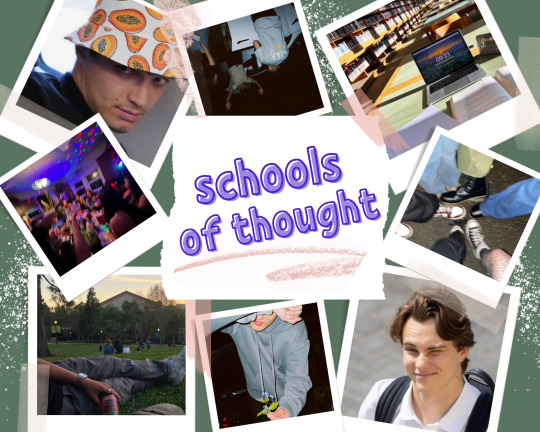
author's notes:
we're being a bit fluid with grid ages, but oscar and lando are sophomores/year 2 of college here
ignore the timestamps, they don't really matter
if you enjoy it, please consider liking / reblogging / commenting! 💙
part 1 🍊 (of 4?)
——————————introducing our protagonists——————————————
INSTAGRAM
@landoooonorriz
📍fed U more like fed UP


liked by charliesangles, carloswithone_S, wochi_jianbing and 158 others
landoooonorriz get in my dump truckkk
view 23 replies
charliesangles photos taken moments before disaster 🕷️😬
maxisnot_here: batman isn't part of the MCU ⤷carloswithone_S: buzzkill
wochi_jianbing nice pic bro ⤷landoooonorriz: ty GY, enjoy shanghaiiii. haha that rhymed comment liked by wochi_jianbing carloswithone_S: on the decks next week let's gooo
GOODREADS
@oz-peartree
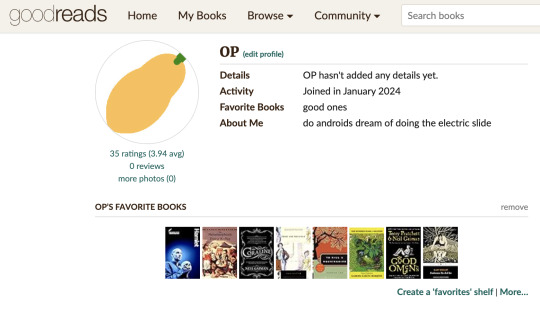
oscar spent most of his summer (or australian winter) hanging out in cafés and reading. he once wrote a 2,000 words review on the merits of good omens on goodreads, but then got embarrassed and also thought it would interfere with his deliberate choice to not leave any reviews besides stars. so he deleted the whole thing and saves it in a folder for himself instead. one of his sisters once stumbled on his goodreads page by accident. he has tried to block her IP across multiple devices but has largely been unsuccessful.
——————————— the seminar —————————————
we zoom in on Federation Internationale University (FIU), a sunny campus nestled up in the hills of monaco. two students, lando norris and oscar piastri, have made it into their sophomore year.
prof vettel's philosophy 204 module is notoriously hard. both of them have to take it as part of their degree requirements (but for lando, maybe also because he enjoys a challenge).
assignment pairs are set by prof seb early in the semester. lando already knows of oscar, and vice versa, but nothing substantial beyond passing each other in the hallway or the occasional library run-in in freshman year. lando's made quite an impression because he once spent half the seminar chatting about how "young stalin was kinda cute" despite stalin not being related to the philosophy syllabus, and it being totally tangential to the topic at hand. half the class agrees with lando, the other half is too overwhelmed by his energy to argue.
oscar just wants to get on with the work already. he was the best kid at his prep school, the prep school that he moved halfway across the world for at 14 and worked hard at, and doesn't like being distracted from his very important goal of being class valedictorian at FIU eventually.
lando gets oscar's number after class, before they both skirt off in different directions. oscar wants to talk to lando about the assignment, but when lando exits the room he's already off talking to another bunch of friends, and oscar's too awkward to jump in.
lando texts first.
iMessage
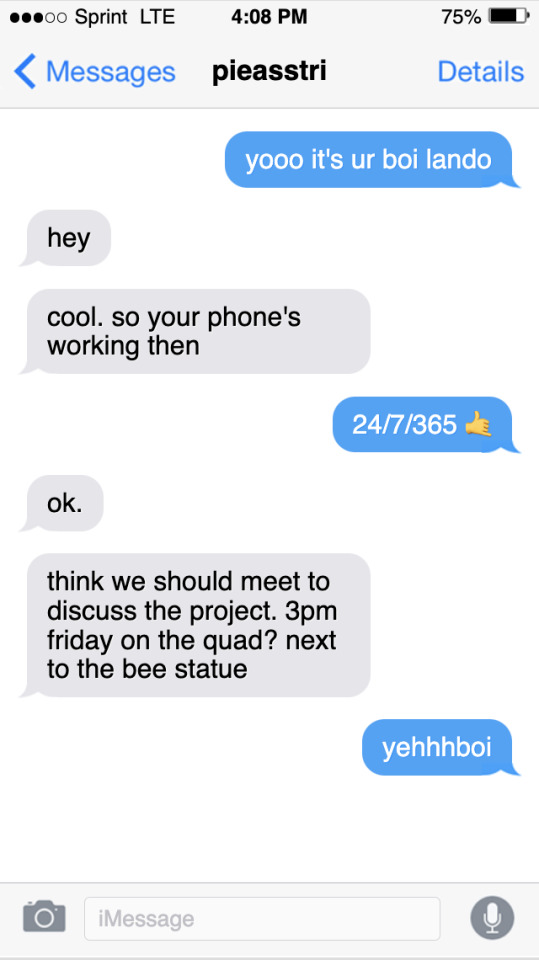
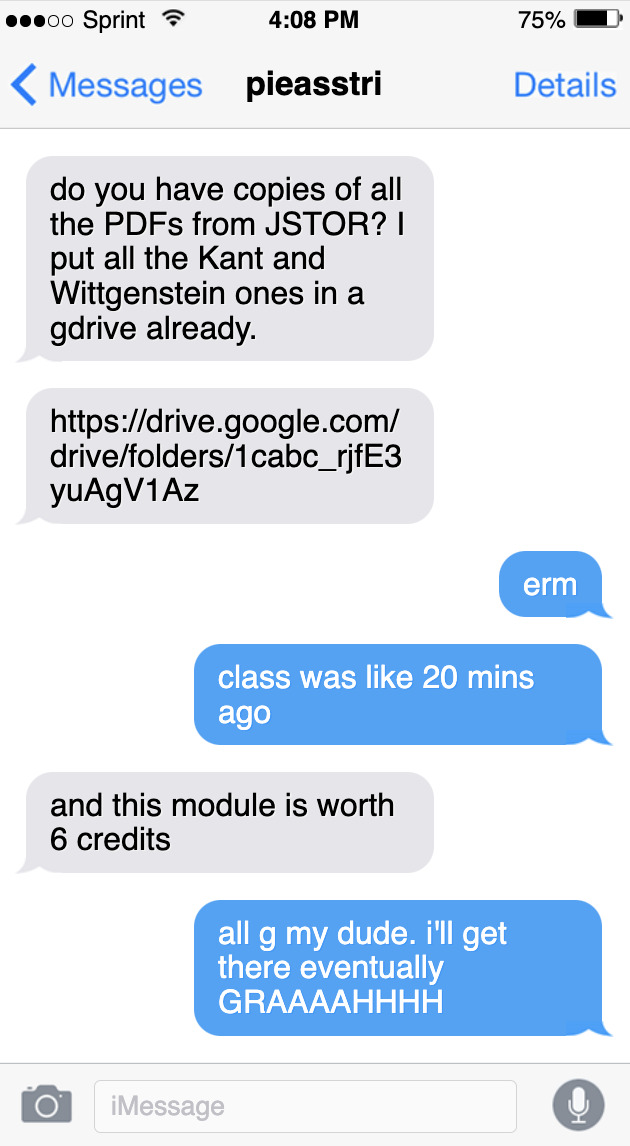
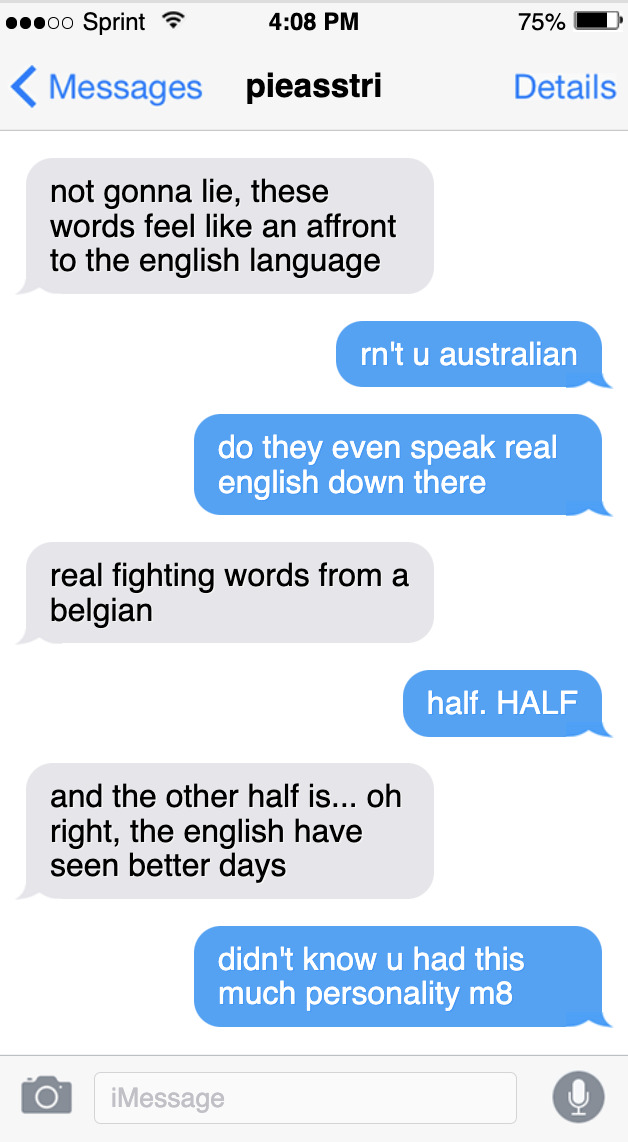
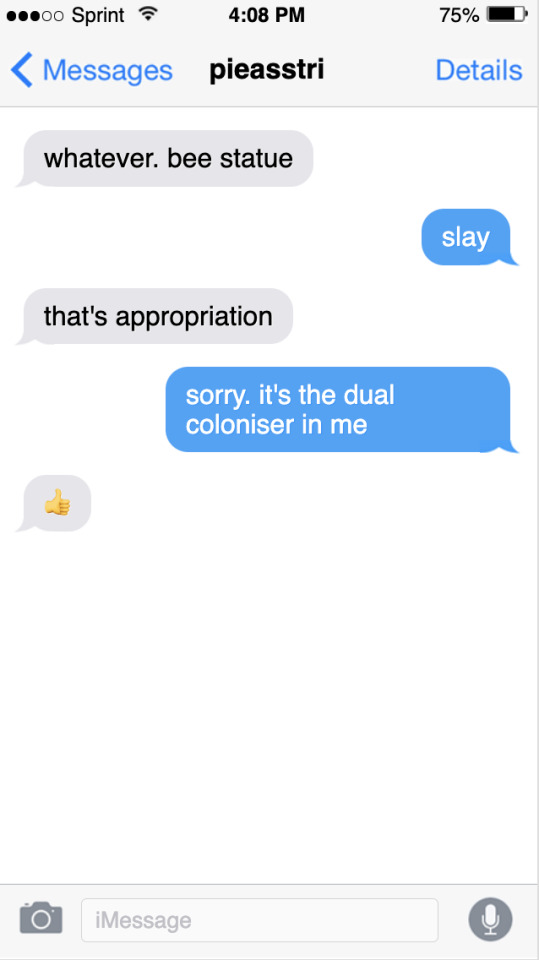
oscar rolls his eyes and gets back to writing his eighteenth century literature class notes.
meanwhile, lando texts max, his roommate and padel bud, about it. max is at a campus hackathon. (max is a junior who has been scouted by at least three big tech firms already, and is on track for early graduation. but lando thinks max has other reasons for wanting to stick around...)
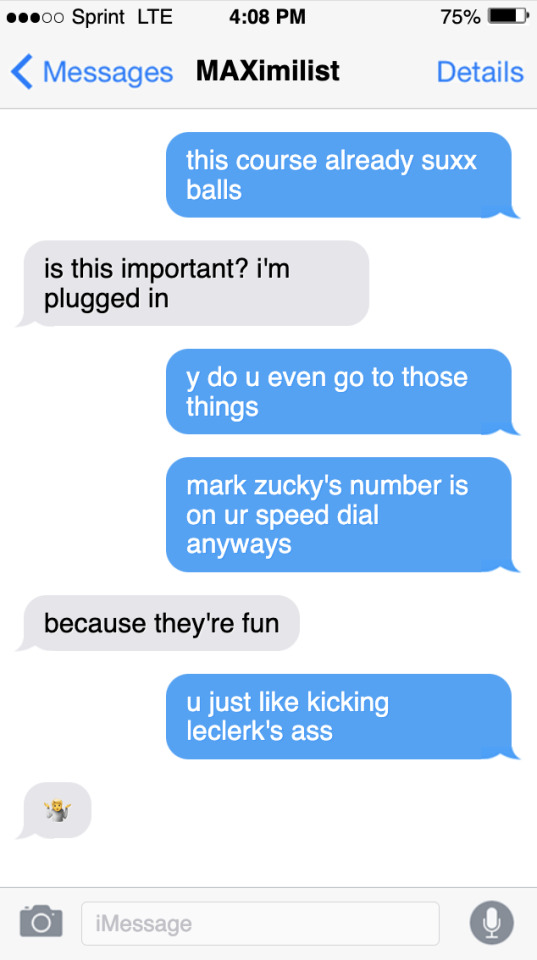
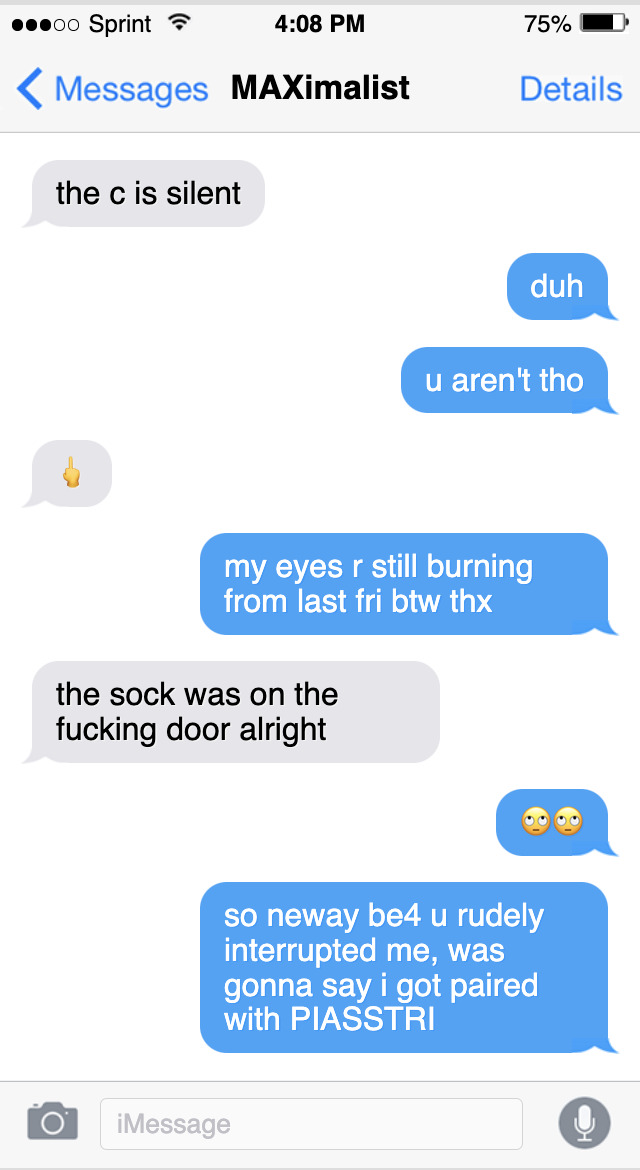
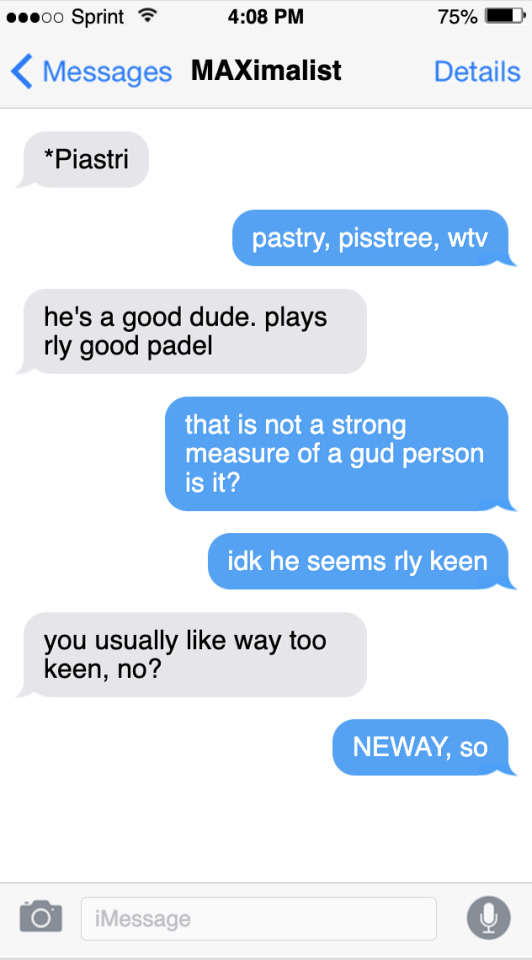
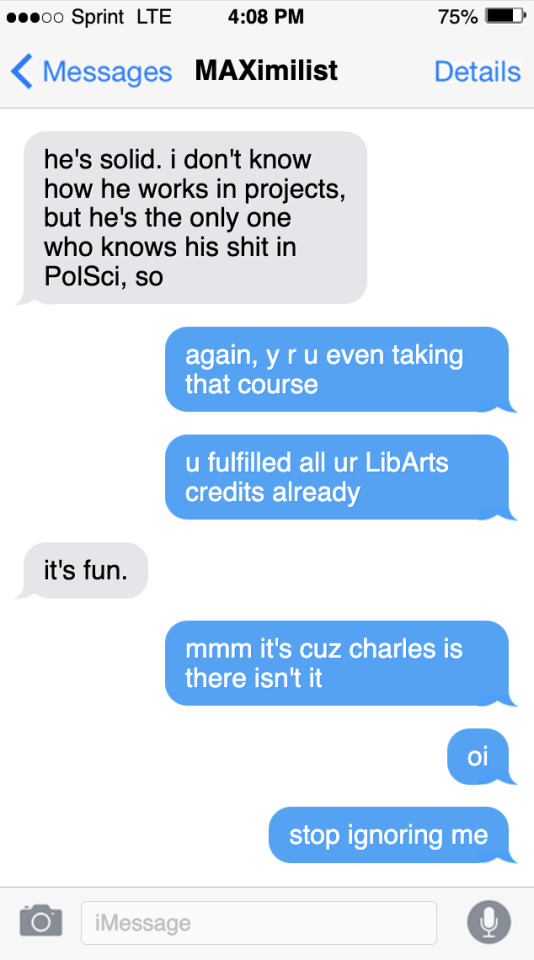
the other thing lando is sure of is that oscar is not in fact better than him at padel. but he is not going to worry about that. or think about how oscar might look, red-faced and flustered and sweaty...
lando's phone pings with social notifications, and the thought disappears.
————meanwhile, the boys do some research——————
lando:
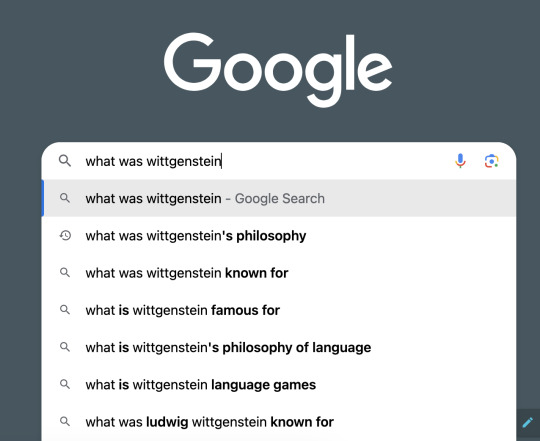


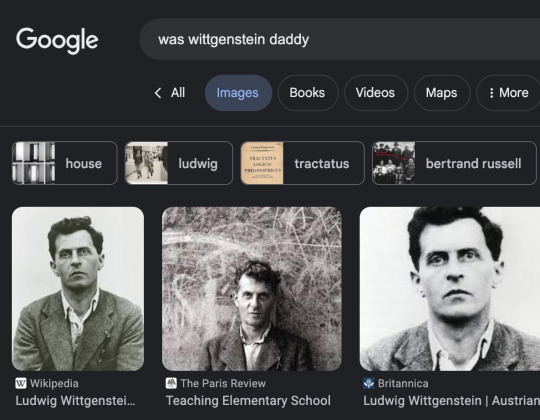
oscar:
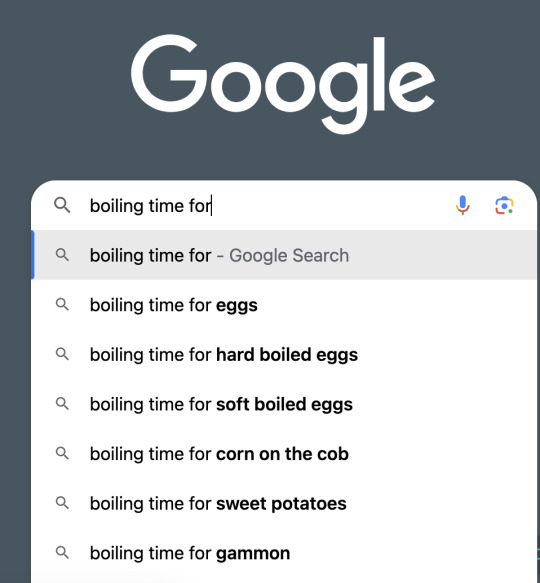
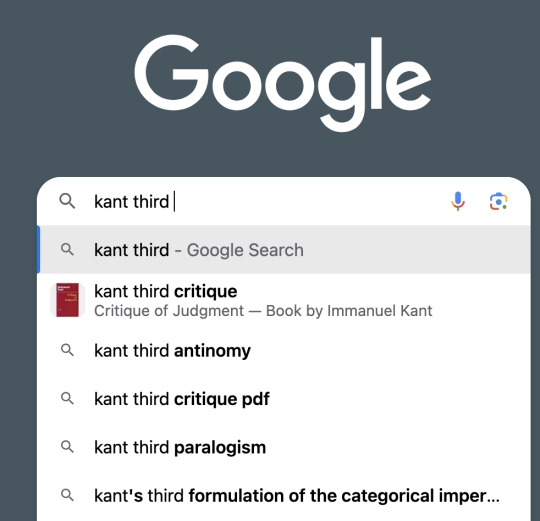

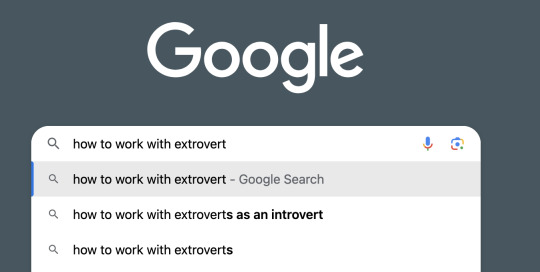
and contrary to popular belief, oscar does have some feelings on the matter. he makes these feelings known to his friend logan, one of the few non-europeans on campus who also knows distinctly what it's like when people make fun of his accent. nevermind that everybody has an accent, oscar thinks. the idea of a neutral accent is an arbitrary invention. he'd just rather not expend the energy fighting people about it.

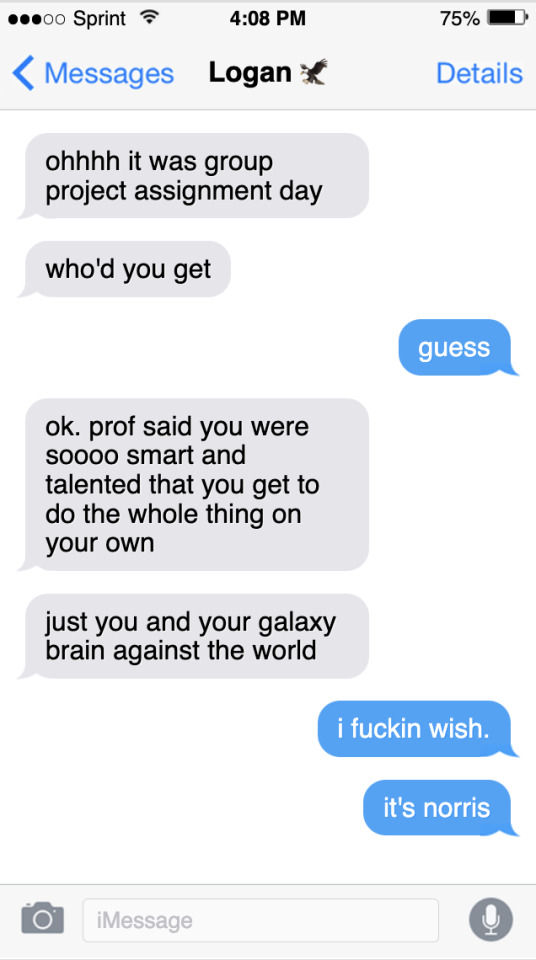
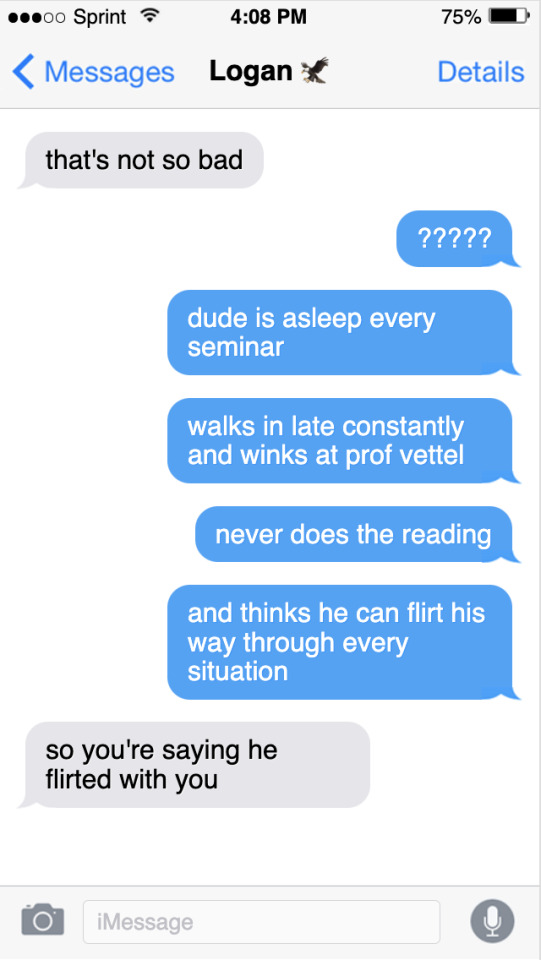
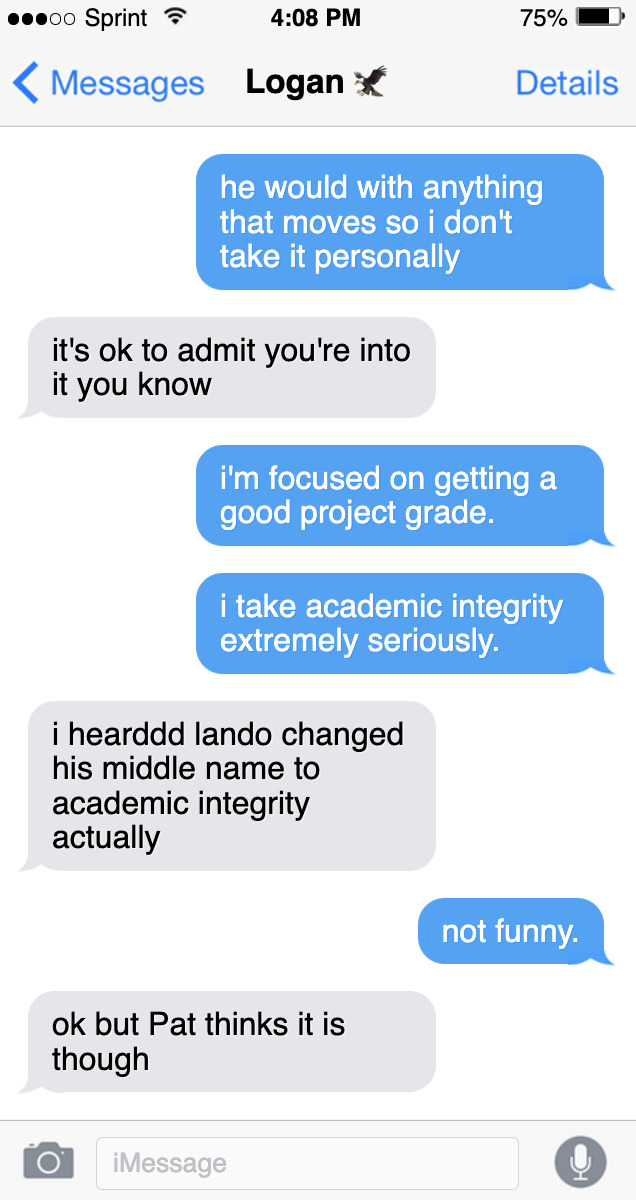
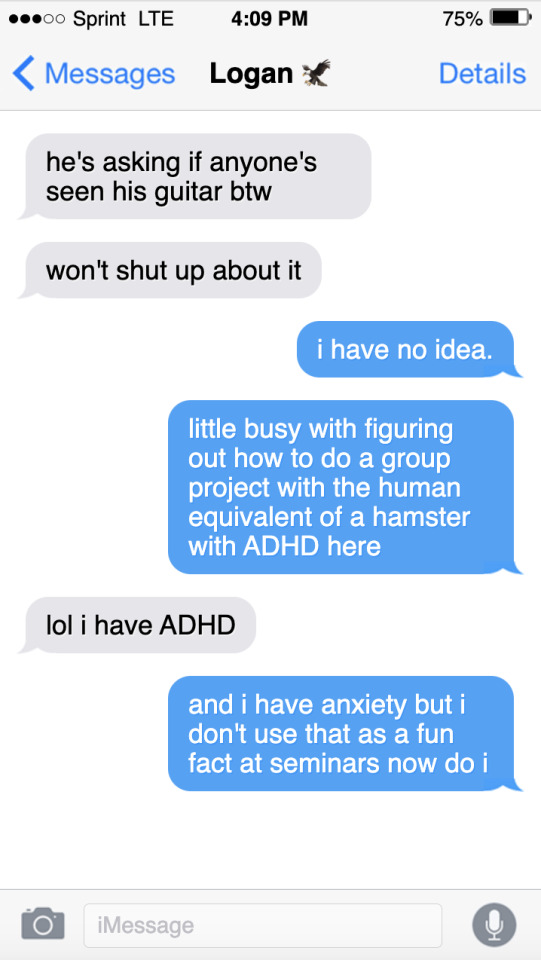
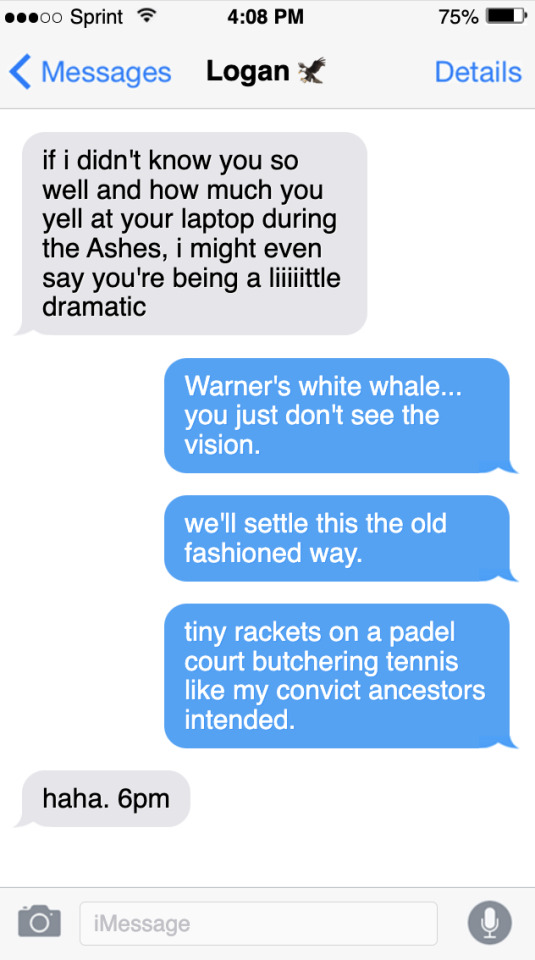
if oscar has any thoughts about how he would feel should lando choose to turn his flirty energy towards oscar himself, well... that is besides the point. because that would never happen. oscar is not interesting, oscar is not noticable. oscar is here to get his grades and move on.
oscar can think of three things that he hates, which he is in the process of overcoming. flight delays, going to the dentist, and now: working in group projects.
but, oscar tells himself, he is a grown man. he's moved halfway across the world to pursue his dream of getting his degree, and then heading on to work in publishing. he tells himself he'll stay focused on this, and nothing else. because pursuing his goals requires singleminded determination. or like the great poet pitbull once said: for anybody going through tough times, been there, done that. every day above ground is a great day, remember that.
so oscar puts his phone face-down on the table. he tries very hard not to think about bee statues or lando for the rest of the day.
(he fails.)
——————————— What happens next, you ask? Stay tuned for Part 2 to find out —————————————
📚 part 2 now live!
more author's notes:
eyy it's my first multimedia(?) fic for f1blr!
this was inspired by an ask. i took some key elements from this (lovely!) prompt and remixed. i meant it to be just one post but i think it's now gonna be four parts, oops.
i love chatting so if you have thoughts or even remotely enjoyed this story, let me know what you think :) or lmk if you want to be tagged on the next updates!
bye!
#landoscar#mctwinks#twinklaren#oscar piastri#lando norris#f1 rpf#f1 fanfic#f1 fic#op81#ln4#814#481#schools of thought f1blr fic#formula 1 fanfic#f1 fanfiction#f1 smau#social media au#814m#lestappen (background)#f1 rpf fic#text fic#landoscar au#wisteriawritesstuff
198 notes
·
View notes
Text
20 questions for fic writers!
Thanks for the tag @maesterchill! Read their answers HERE.
1. How many works do you have on AO3?
My stats tell me that I've written 50, but 5 are multi-chapter collections, so... a lot. Yeah.
2. What’s your total AO3 word count?
733,820. If you asked me three years ago if I could ever write that much I would've laughed in your face. Isn't growth amazing?
3. What fandoms do you write for?
Harry Potter (though I do read some Good Omens, Carry on Simon and Bagginshield stuff)
4. What are your top 5 fics by kudos?
UGH. I don't want to be honest here, since 2 of the five are Dramione fics I've now listed as ANON because of harassment reasons. I'll give you the NEXT five instead ;) 1. 93 Diagon Alley (Harry x George) They were roommates 2. HP Cocktober 2022 Collection (Multiple) Prompt fest 3. Solace (Harry x George) Unhealthy coping mechanisms (sex) 4. When Malfoy Met Granger... (Draco x Hermione) WHMS remake 5. Mistletoe, or Die F***ing (Harry x Fred x George) Self-explan.
5. Do you respond to comments? Why or why not?
Yes. I try to, because the BEST part of sharing is connecting with people who enjoy what I've done. Community, ya know?
6. What is the fic you wrote with the angstiest ending?
Mastermind (Draco x Hermione, Draco x Harry, Draco x Ron, Ron x Harry) The worst UHEA I've ever inflicted on y'all is this Dronarry fest 2023 story. Dark stalker Draco goes off the rails in the end. It's a masterpiece, I'm so proud of it.
7. What’s the fic you wrote with the happiest ending?
From Sunset to Star Rise (Harry x Ron) Cozy fall vibes, falling in love, little to no angst (Ron has a tiny bit of anxiety, that's all)
8. Do you get hate on fics?
Yes. Mainly the bigger ship ones (Dramione, looking at you) If you're wondering WHY I write rare pairs a lot, it's because rare pair fandom is a safe space with AWESOME people. We may be few in number, but WE GO HARD and LOVE HARDER.
9. Do you write smut? If so, what kind?
ALL KINDS (though I'm not great a fluffy smut). Check out my HP Kinktober Collection 2023 posting daily RIGHT NOW. It's very kinky and dark.
10. Do you write crossovers? What’s the craziest one you’ve written?
The closest I've come to crossover is more like "inspired by a vibe." I wrote a Community (TV Series) inspired paintball fic here: All's Fair in Love & War & Paintball (multiple ships)
11. Have you ever had a fic stolen?
No, BUT I've had people post me on Goodreads. Read my thoughts on why this is bad fandom etiquette HERE
12. Have you ever had a fic translated?
I've had many requests, but no one has followed through yet.
13. Have you ever co-written a fic before?
No! But I'm interested in this concept, especially if the co-author is someone I vibe with.
14. What’s your all time favourite ship?
STAWP. It's too hard a question! Lately, I'm obsessed with Dronarry, and any combination of those three. I also think I'm more in love with stories than ships. If it's an amazing story I end it with "OMG this is the BEST EVER" and I say it about a lot of ships.
15. What’s a WIP you want to finish but doubt you ever will?
I'm writing a multichap Drarry fic where Draco is a wandmaker, and it's falling in love fluff. I'm terrified to write them because I feel like I'll get torn to shreds because the Drarry fandom is too amazing for the likes of little old me. I'll just read Drarry and call it good, and MAYBE I'll get the courage to finish someday.
16. What are your writing strengths?
Ideas. I'm chockful of ideas. Also, I read a ton, so I think the more you read, the better you write.
17. What are your writing weaknesses?
Fluff. I HATE writing fluff. Why is it so hard?
18. Thoughts on writing dialogue in another language in fic?
I don't typically do it because I'm monolingual and don't want to fuck it up. I don't mind when others do it
19. First fandom you wrote for?
Harry Potter!
20. Favourite fic you’ve written?
How to Care for Your Monster Book: A Guide by Rubeus Hagrid (Hagrid x Monster Book of Monsters) Y'aaaaaallll... I have no regrets about this fic. It's the only fic I've ever written that is perfect, I'll never top it, it's just so funny and weird (like me).
Tagging: @the-francakes @mugsdontlie @swoontodeath @vukovich @mintawasalreadytaken @peachpety @nv-md @lumosatnight and anyone else who wants to
25 notes
·
View notes
Note
I was in the process of writing a piece and I wanted to ask about what sorts of language and profanity were allowed. obviously, I don't want anything that could be seen as a slur, or something offensive, but I want to know where the line is to avoid making something that seems either too crude, or undeveloped.
Good morning! Co-editor T.C. Mill here.
So initially I admit I was surprised by this question. We are the New Smut Project, after all. Our target audience is not those busybodies who rate books 1 star on Goodreads because a character says "Jesus fucking Christ!" at some point.
But as I woke up more and considered it, I see where you're coming from, Anon. There is such a thing, for our purposes (not everyone's! Sexy is subjective. But we're cultivating particular kinds of sexiness here), as "too crude." It's a matter of more than word choice, though.
In previous guidelines we noted a preference for "tasteful" word choice and specified liking "come" over "cum". That last bit's still our preference - and our house style - but we can always change "cum" to "come" in copyedits, along with adding serial commas (and in all honesty, we can be argued out of either change in individual cases to fit an author's artistic vision. Maybe the characters are sexting and there's no way they're typing four letters when they can type three. Etc.)
"Tasteful," I realize now, is too vague. I love the word "cunt" much more than "pussy." Other people feel the exact opposite and to them, that's tasteful. Mood matters too. What's tasteful in the heat of the moment can feel crude on the first page of the story (not always, though! A first page that opens with something really raw and passionate will get my attention!). If the story's a piece of IKEA erotica with flat(-pack) characters going through the motions, just about any word choice will sound cringe.
Also for a combination of reasons "fuck" doesn't even parse as profanity to me anymore, so there's that.
If you look at our tag for Terms and Language you'll see a range of people's ideas, opinions, and favorite vocabulary - everything from discussions of identity labels to synonyms for "cock."
In our author interviews for Cunning Linguists (to some people, that title is probably too crude), we asked about people's favorite and least favorite words in sex writing, and received some fascinating, funny, and steamy answers!
Finding the right word to fit the moment is always one of the writer's challenges and privileges, whether writing sex or anything else. That said, some advice that I think could be helpful here: NSP Co-Editor Alex Freeman's article "Sex Writing 101."
It breaks down a sex scene into different 'ingredients' - action, reaction, dialogue, sensory details, and so on. If that sounds a bit technical, I'd encourage you to look at it as descriptive rather than prescriptive -- it's possible to write a great sex scene without any dialogue, for instance! But looking at where dialogue appears in the example sex scene and what it adds can spark some ideas that help any story to feel more vivid and interesting. That help to build an erotic mood.
The same word might feel "too crude" if it appears in an underdeveloped scene and, in a piece where intimacy and erotic tension have been built, it might feel absolutely fucking perfect.
It's not tastefulness we're looking for so much as the right combination of juicy flavors.
As a closing thought: the deeper you get into your character's POV throughout the story, the more freedom you have to use whatever language they would use.
Wait, I lied, one more closing thought: If your story has a title like "I Had Sex With My 18-Year-Old Babysitter Last Night," we are going to be turned off by it before we read the first page, even if none of those words are individually crude. Though the fact is the people sending us those stories probably haven't bothered to read any part of our site except the email address to send their stories in to. If you're making an effort, you'll come in ahead of them. (Note: this is not a reference to any one submission we've received, but rather a whole number of them - pieces that are very artless, cliche, and often make use of power dynamics in a way we really aren't about.)
13 notes
·
View notes
Text
Infodump
Whoops it looks like my threat to infodump backfired lol
I wanna let you guys get to know me without compromising my personal information online so if this seems vague in weird spots that's why.
Name: well I just looked through my several Name notes and saw the name Maewyn (the name of my future daughter in Stardew Valley lol) and I like that so why not, if you need to refer to me call me Maewyn or Mae.
Family: I live with my parents and sister, all of whom I adore! I'm the eldest child. We got our first dog when I was 12 and he's still with us.
Favorite Color: Purple. It's pretty and I look good in it ngl. I prefer more blue-tinted shades like indigo or periwinkle.
Favorite flower: it's insanely hard to choose! Botanical gardens and hikes through parks are some of my favorite activities and oh my goodness the pretty plants you see in those places. I might just have to say roses because I have three bushes of my own in the front garden that I tend to every summer and fall.
Favorite Animal: Elephants! I have reasons but I'm not going to articulate that right now sorry
Favorite metal: I'm not a very jewelry oriented person, mostly because of my eczema, but I own mostly silver jewelry.
Favorite stone: once again hard to choose, they're all so pretty. Opal is magnificent, but my only problem with it is it's so soft, so as a practical person who prefers day-to-day wear, it's not the best stone for me.
Zodiac (just in case you were thinking of asking): All I know is I'm a Scorpio.
Hogwarts House: I took the Pottermore quiz in fifth grade and got assigned Ravenclaw so that's what I'm sticking to. Not knowing anything about Harry Potter, I think I'm a Ravenclaw with Hufflepuff tendencies, or vice versa.
Favorite thing to study: I am a student of a lot of things so it's hard to choose, I think every subject has its charm. I love reading and thinking about themes and creative writing (obviously) but I couldn't see doing that for a living because I fear I either wouldn't be motivated enough or having to make money off of something artistic would take the joy out of it. I'm studying Computer Science, and it's very interesting. Biology and Anatomy are super cool as well, but once again I don't think I'm suited to the life of a researcher or a doctor.
Hopes and dreams: just to be a well-adjusted and kind person. I want to be the person that people are drawn to and feel like they can trust, the kind of person where "my door is always open" is a reliable statement. I'm a very shy and quiet person, and maybe not necessarily super emotive, so I feel like at the moment it's a bit hard for people to believe that I care or I'm someone who could care, even though I do, very deeply. Literally my personality goals are Peeta Mellark, Beth March, Samwise Gamgee, and I think my faith plays a lot into that.
Other Fandoms: Star Wars (esp. the Prequels and cartoons) and Star Trek for sure!! I have another sideblog dedicated to that. I'm watching ST:TOS right now and it is so unbelievably fun. I used to be a Marvel fan. I'm still a hardcore Spider-man fan (all media fr fr). I play Stardew Valley, a little Palia but just for the graphics if I'm honest. Uhhh I'm blanking right now so that must mean those are the really important ones.
Fun facts:
I need all four wisdom teeth removed and either braces or Invisalign in the next few years, along with a not-so-purely-cosmetic periodontal surgery.
I downloaded Goodreads maybe three weeks ago and I have 229 books on my Want to Read list.
I skipped all of my high school English classes through Dual Enrollment.
When I clean my room I clean clean but I only do it once every one or two months, and in between it kind of turns into a disaster zone.
I'm gonna get my hair cut from 18 inches to 4-6 inches in a couple months and I'm nervous and excited at the same time.
I want to make myself a capsule wardrobe soon.
I crochet and as soon as I have a little more free time I'm going to teach myself to knit. After that probably quilting, even though I suck at sewing.
I interviewed someone about his beard today.
I'm watching The Vow with my family right now when I probably should be working on my physics.
And if you know me irl, these fun facts will probably let you piece together that it's me running this blog.
That concludes this evening's infodump, I hope you enjoyed.
1 note
·
View note
Text
Books I Read and Liked Before Reading 'The Fault In Our Stars' by John Green:
I wanted to do 'The Fault In Our Stars' first for reasons stated in the more information section of that post but there are some other books from before that I'd like to share. However, I don't have the energy to do all of them at once so they will just all have the above title so that is how you will know.
'When We Collided' by Emery Lord:

Description: We are seventeen and shattered and still dancing. We have messy, throbbing hearts, and we are stronger than anyone could ever know... Jonah never thought a girl like Vivi would come along. Vivi didn't know Jonah would light up her world. Neither of them expected a summer like this... a summer that would rewrite their futures. In an unflinching story about new love, old wounds, and forces beyond our control, two teens find that when you collide with the right person at just the right time, it will change you forever.
Favorite Quote(s):
"We know there are three little words branded inside my heart: Jonah was here" (Lord 327).
"Vivi would say he was descended from redwoods" (Lord 102).
Favorite Character(s): (I couldn't decide) Vivi, Jonah
Started: December 12th 2022
Finished: January 13th 2023
Pages: 337
Genre: Romance, Young Adult, Realistic Fiction, Mental Health
Warning(s): Bipolar Disorder, Suicide Discussed, Self Harm Mentioned, Weight Loss Mentioned, Psychiatric Hospitalization, Death of a Parent via Heart Attack, Car Accident
My Rating: 5/5⭐️
Goodreads Rating: 3.83/5⭐️
⚠️Spoilers⚠️:
Favorite Quote(s): N/A
✅️Spoiler Free✅️:
More Information: There were quite a few different conflicts making it a bit confusing at times. I didn't really like that but y'know. It was generally really good though.
Reason(s) For Reading:
Wanted something different than my usual reads
I'd heard about it on Booktok and found it in my local library's free cart
Looked Pretty
Update: Spelling and format errors.
8 notes
·
View notes
Text
Blog Tour + #Review: CITY SPIES: CITY OF THE DEAD by James Ponti (w/ #giveaway)!

Welcome to Book-Keeping and my stop on the Rockstar Book Tours blog tour for the fourth installment in the City Spies series by James Ponti, City Spies: City of the Dead, which releases next Tuesday, 7 February! If you’ve followed my reviews before, you’ll know what a huge fan I am of this series, so I’m thrilled to tell you all about this latest installment. You can also find my review and a giveaway below!
About the Book

title: City Spies: City of the Dead author: James Ponti publisher: Aladdin release date: 7 February 2023
In this fourth installment in the New York Times bestselling series from Edgar Award winner James Ponti, the young group of spies go codebreaking in Cairo in another international adventure perfect for fans of Spy School and Mrs. Smith’s Spy School for Girls. Codename Kathmandu, better known as Kat, loves logic and order, has a favorite eight-digit number, and can spot a pattern from a mile away. So when a series of cyberattacks hits key locations in London while the spies are testing security for the British Museum, it’s clear that Kat’s skill for finding reason in what seems like randomness makes her the perfect candidate to lead the job. And while the team follows the deciphered messages to Egypt and the ancient City of the Dead to discover who is behind the attacks and why, Kat soon realizes that there’s another layer to the mystery. With more players, more clues, and involving higher levels of British Intelligence than ever before, this mission is one of the most complex that the group has faced to date. And it’s also going to bring about a change to the City Spies…
Add to Goodreads Purchase the Book Check out the Book Trailer

Grab the rest of the City Spies books now!
About the Author

JAMES PONTI (he/him/his) is the New York Times bestselling author of three middle grade book series: City Spies, about an unlikely squad of five kids from around the world who form an elite MI6 Spy Team; the Edgar Award–winning Framed! series, about a pair of tweens who solve mysteries in Washington, DC; and the Dead City trilogy, about a secret society that polices the undead living beneath Manhattan. His books have appeared on more than fifteen different state award lists and he is the founder of a writers group known as the Renegades of Middle Grade. James is also an Emmy– nominated television writer and producer who has worked for many networks including Nickelodeon, Disney Channel, PBS, History, and Spike TV, as well as NBC Sports. He lives with his family in Orlando, Florida.
Connect with James: Website | Twitter | Instagram | Facebook | Goodreads | Amazon
My 5-Star Review
If you’ve followed my reviews for any length of time, you may know just how much I love this middle grade series. My son and I have both read them all (though he hasn’t yet gotten his hands on this latest one!), and we’ve also read, both separately and out loud together, Mr. Ponti’s Dead City series, which we also love. (He has also read the Framed! series, though I have not.) Naturally I was going to jump at the chance to read and review book four! (You can find my reviews of book one here and book two here.)
While I suppose you technically could read this as a standalone, I would highly recommend reading the first three books first -- you’ll get a much better feel for the characters, and they’re totally all worth reading! In each book, a different one of our “city spies” (their codenames are each the cities in which they were found) is the alpha, or leader, of the mission. In book four, it’s Kat’s turn, and she leads in several missions throughout the book, which take the spies from London to Berlin to, ultimately, Cairo and Luxor, Egypt. Kat has always been a favorite character of mine -- she has Asperger’s and is able to see patterns amid all the chaos of life. She’s truly brilliant and refreshingly honest and plain-spoken! The spies continue hot on the heels of Umbra in this installment, and there’s a surprise addition to the City Spies team that no one was expecting. I literally read the entire book in one sitting; I just couldn’t stop flipping the pages!
I highly, highly recommend this series for all middle grade readers (will be especially good for reluctant readers!), as well as anyone who just enjoys a good spy thriller (one appropriate for kids, of course). This installment continues the unbroken string of five-star reviews for each book in the series. And with *that ending*, I can’t wait to read book five!
Rating: 5 stars!
**Disclosure: I received a copy of the book from the publisher for purposes of this blog tour. This review is voluntary on my part and reflects my honest rating and review of the book.
About the Giveaway
One (1) lucky winner will receive a finished copy of City Spies: City of the Dead by James Ponti! This one is US only and ends on 6 February 2023. Enter via the Rafflecopter below, and good luck!
a Rafflecopter giveaway
About the Blog Tour + James’ Tours
Here’s the schedule for this second and final week of the blog tour, as well as James’ schedule of tours for the book launch!
Blog Tour, Week Two:
1/30/2023 - Nerdophiles - Review 1/30/2023 - Eye-Rolling Demigod's Book Blog - Review/IG Post
1/31/2023 - Wanderingwitchreads - TikTok Review/IG Post 1/31/2023 - Review Thick And Thin - Review/IG Post
2/1/2023 - @ChristenKrumm - IG Review 2/1/2023 - Two Points of Interest - Review
2/2/2023 - Book-Keeping - Review/IG Post 2/2/2023 - @bookmama85 - IG Review
2/3/2023 - OneMoreExclamation - Review/IG Post 2/3/2023 - @froggyreadteach - IG Review
James’ launch tours:

Monday, February 7, 2023 at 6:00pm CT Virtual launch event hosted by Blue Willow Bookshop (Houston, TX) In conversation with Kelly Yang (author of NEW FROM HERE and FINALLY SEEN)

Wednesday, February 8, 2023 at 7:00pm ET In-person event hosted by Little Shop of Stories (Decatur, GA) In conversation with Laurel Snyder (author of ORPHAN ISLAND and CHARLIE & MOUSE)
Thursday, February 9, 2023 at 6:00pm ET In-person event hosted by Malaprop’s (Asheville, NC) In conversation with Alan Gratz (author of REFUGEE, GROUND ZERO, and TWO DEGREES)
Friday, February 10, 2023 at 5:00pm ET In-person event hosted by RJ Julia Booksellers (Madison, CT) In conversation with Lauren Tarshis (author of the I SURVIVED series)
Saturday, February 11, 2023 at 3:00pm ET In-person event hosted by Books of Wonder (New York, NY) In conversation with Sayantani DasGupta (author of THE FIRE QUEEN series), Chris Grabenstein (author of DOG SQUAD and THE SMARTEST KID IN THE UNIVERSE), and Karina Yan Glaser (author of THE VANDERBEEKERS series)
Sunday, February 12, 2023 at 2:00pm CT In-person event at St. Louis Public Library hosted by The Novel Neighbor (St. Louis, MO) In conversation with George Jreije (author of SHAD HADID AND THE ALCHEMISTS OF ALEXANDRIA)
Monday, February 13, 2023 at 7:00pm CT In-person event hosted by Wild Rumpus Books for Young Readers (Minneapolis, MN) In conversation with Jacqueline West (author of THE BOOKS OF ELSEWHERE and LONG LOST)
Tuesday, February 14, 2023 at 5:30pm ET In-person event hosted by Quail Ridge Books (Raleigh, NC) In conversation with Kwame Mbalia (author of the TRISTAN STRONG series)
Thursday, February 16, 2023 at 10:30am ET In-person event hosted by Politics & Prose (Washington, D.C.)
Saturday, February 18, 2023 at 2:00pm ET In-person event hosted by The International Spy Museum (Washington, D.C.)
Saturday, February 25, 2023 at 2:00pm ET In-person event hosted at Lake Highland Prep School hosted by Writer’s Block Bookstore (Orlando, FL) In conversation with Jerry Craft (author of NEW KID and CLASS ACT)

#city spies#city spies series#mglit#mgseries#middle grade#middlegrade#middle school#spy thriller#mg thriller#kidlit#kid lit#james ponti#Simon and Schuster#simon kids#simonkids#simonkidscrew#getunderlined#city of the dead#cairo egypt#cairo#luxor egypt#luxoregypt#luxor#blog tour#book review#bookreview#bookreviews#book reccomendation#5 stars#5 star
4 notes
·
View notes
Text
you know what I'm just gonna drop it here. for closure <3
To preface this, I made a goodreads account solely to rate this book because it enraged me just that much.
Alright! First of all, I'd like to explain my two star rating: the only reason I didn't give this trainwreck one star is that the first half of the book was decently funny in places. I liveblogged reading it on my tumblr, and generally had a good time!
The second half, though. Oh boy.
But let's not get ahead of ourselves. First of all, I'd like to say a few words about our titular characters:
They are actually insufferable. Mary Eliza Philipse is one of the flattest, most undynamic, helpless characters I've had the displeasure of reading about in a long time. There's nothing to her except the trauma and guilt about her mother's death and the fact that the "Belle of the north" is too humble and oblivious to realise that everyone is attracted to her.
She considers herself cursed because of the various deaths following her, and I must admit, in the beginning I did feel for her a little, but good God it's the only thing this girl ever thinks about. Well, aside from her general tingliness in the presence of one Colonel Washington.
Our boy George himself was... ugh. I am an unabashed enjoyer of George Washington fiction, even if his character usually ends up lowkey to highkey annoying; I don't mind it that much as long as he's entertaining.
Here, he was... fine? In places. He keeps mentally repeating the rules of decency or whatever to himself, which I found extremely funny. I also have to remind myself how to act like a normal human at any given time #NeurodivergentMood
But yeah, this isn't my favourite George I've seen by a long shot. The man is always pining for his One True Love, and when he isn't, he's preoccupied with his military exploits that are usually written as dryly as humanly possible.
Now, this feels like a good place to segue into what infuriated me the most about this goddamn novel:
The writing. It's. BAD. It's just bad! I don't even know what more to say! As a writer myself, I was borderline foaming at the mouth with every new poorly constructed and entirely unemotional paragraph.
Isn't Mary Calvi a journalist? Isn't she supposed to know what sentence structure is? That she can start sentences with words other than "She" and "He"? That synonyms exist and she in fact doesn't have to reuse the exact same word for three sentences in a row when it doesn't serve any purpose aside from getting on my nerves? Shouldn't she be aware of... filter words? This is a huge reason why I felt (<- filter word btw!) so removed from our POV characters the entire time. They are little more than words on a page, and Mary Calvi has no interest in making you forget that fact.
I would like to provide a brief example before we move on. This is a direct quote: "He [George] stroked the side of her face. He felt her shiver. He placed his other hand into the back of her hair, feeling silkiness through his fingers. He felt her relax in his arms, soften."
Ah yes. Sixth grade level creative writing in a professionally published book written by a journalist, we love to see it.
Okay, moving on to my last point: plot.
The plot was... well, for the most part, not really present? The first half (Part One and Two) were more character driven, our lovebirds getting to know one another and falling in love—or, well, "tingliness". And that was fine! As I said, the first half of the novel was the more enjoyable part!
Unfortunately, with Part Three and Four, Mary Calvi tries herself at an actual plot, or something resembling such. Our star-crossed lovers are separated when George is called back to the military, and as a warning, this is where I'm going to get into spoilers.
Their separation was actually unbearable. George's parts were little more than dry descriptions of military life and efforts, and Mary... I honestly don't know, I zoned out for most of her rambling. She is heartbroken over their separation, she is determined to keep her promise of waiting for him, she is lonely, she is being courted by Some Guy who she ends up marrying in spite of everything, she laments that two years have passed without word from George and that she doesn't know how much longer she can wait because at this point she is 27.
Please remember that. George never writes to her—and he doesn't! Not from what we, the readers, see! He pines and frets and yearns for his sweet Mary Eliza, and yet we never see him write to her even just once. He has some other military guy who sends him letters about Mary to keep him updated (normal behaviour btw).
And yet! The big plottwist at the end (after the twenty year timeskip that I am not getting into because it made everything so much worse) is Mary receiving a bunch of his letters... which he wrote to her back then... unbeknownst to the reader... kept away from her by her older brother so she would mary That Other Guy.
Like. MAN. It would have made an adequate plot point if it hadn't been so convoluted. Just a little bit of foreshadowing... a single mention of letters... apart from that one time they briefly reunite and George thinks for one sentence that he wants to ask why she never responded to his letters. Sir, what letters are you TALKING about. For the love of GOD.
Okay. Calm.
Yeah so, this really reads more as a very early draft than a finished novel. Sentences like "She [Mary] tiptoed and her bare feet felt the touch of the cool wood below her feet." early on in the book did not inspire much confidence. Did this book have an actual editor? Or did Mary Calvi just throw all her thoughts into a manuscript and sent it straight to print.
Now, to close this review out: if you're a fan of corny historical fiction romances featuring the first president of the United States of America, I'm afraid I would have to recommend this to you—not because it's worth a read, but because the genre is unfortunately not very plentiful. If you're simply a fan of historical romances, I am 100% certain you can find something actually pleasant to read. If you're set on reading this one, I'd recommend stopping after Part Two, because the latter half is barely tolerable.
Anyway, thanks for reading. I feel better now <3
alright I typed up my review of Dear George, Dear Mary on goodreads. do not understand goodreads tho and have no idea how to share it on here. uhhhh profile
10 notes
·
View notes
Photo
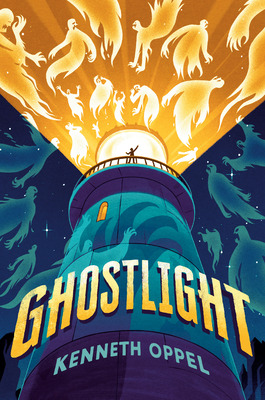

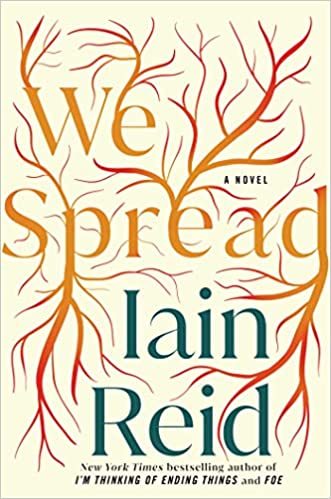
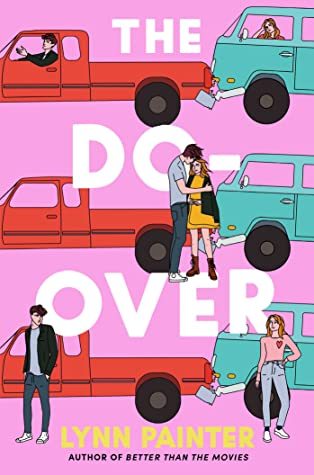





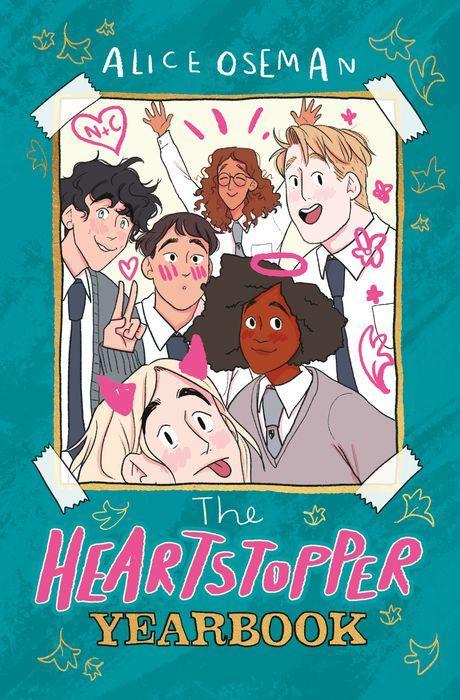
REVIEWS OF THE WEEK!
Books I’ve read so far in 2022!
Friend me on Goodreads here to follow my more up to date reading journey for the year!
___
281. Ghostlight by Kenneth Oppel--⭐️⭐️⭐️⭐️
I received a copy via the publisher in exchange for an honest review! This review is very overdue but reading slumps wait for no person! I'm a fan of Oppel's writing, especially his horror, because he has a way of making my spine crawl even though this book is technically for a middle grade audience. But it's also because of his spooky writing that feels older that makes this the perfect book for those young readers who straddle the line between middle grade and young adult fiction. My reason for the four star is that I thought it was a little slow to start, but once it started, it really picked up! But big stars for creepiness, originality, and the way grief is portrayed. If you like ghost stories that have you grimacing because of the imagery, or remind you of those creepy movies where the ghost is crawling on the ceiling in that broken way of theirs, then you might really enjoy this. GHOSTLIGHT has a really unique storyline and I wouldn't mind seeing more from these characters and the other adventures they could go on. Also, love seeing Toronto in this and recognizing some of the places the characters go to. Can't wait to see what Oppel writes next!
___
282. Vampires Never Get Old by Various--⭐️⭐️⭐️
I've been listening to a few more short stories and while I'm still not the biggest fan, I'm willing to try more of them! This was an attempt of mine to read more and while some stories were intriguing, others were just okay and I'll admit, I've forgotten a few of them by now. The one that caught my eye is most definitely that last one that inspired a very short-lived Netflix tv show. I think the ending of that one was really intriguing and could have made for a good beginning to a horror haunt and not a tragic love story. Another one was the gravedigger one. It was so intriguing and the emotion behind the writing was palpable. Probably one of my favourites. Finally, the other one that really stood out to me was the guide for newly made vampires. That was fun and entertaining. I think one of the unique things about this collection was how we had a brief explanation of how each story relates to a different vampiric lore. Another thing, which I'm still torn on, is the fact that this was formatted like it was for book reports or book clubs, asking questions at the end of each explanation. I felt like I was back in school. Anyway, this was entertaining enough and I think it would be great for October (for those who read seasonally).
___
283. We Spread by Iain Reid--⭐️⭐️
I received a copy via the publisher! I have enjoyed the past books that Reid has written, especially their weirdness and how uncomfortable they made me feel by the end. But this book. This book was different. I had to go back like three times to re-read a good chunk of the end because my brain just wasn't comprehending what was going on. I can see why someone might enjoy this--the atmosphere Reid creates in his books is always intriguing and very well done. That alone can be haunting and can pull the reader in. And while this book had some of that, I just found myself confused and bored. Anyway, this wasn't for me but I can see how so many could love it!
___
284. The Do-Over by Lynn Painter--⭐️⭐️⭐️⭐️⭐️
I received a copy via the publisher as an Indigo employee. I'm a huge fan of Painter and her fun and quirky romantic stories. Every time I pick up one of her books, I know I'm about to fall into a very entertaining story. Her characters are always swoony and I know I'm going to be hooked on the story. This book did not disappoint! I loved the concept of this story because it had that fun no-consequences storyline because the MC had to relive the same day over and over again. I liked that she had to find herself in order to escape the repetition. The love interest was the perfect choice for her because of how he gets her to break that perfect mask she's created for herself. I went more into detail about this one in my interview with the author over on Indigo's page. But know that this was funny, romantic (that one specific day had my heart racing because of how cute it was), and occasionally heartbreaking as you learn more about her parents' divorce and how their parenting has affected her growing up. Highly recommend, especially if you love romcoms with a twist and an MC who grows steadily as the story progresses but is still, at her core, a teenager trying to find herself in her cracking seemingly perfect world.
___
285. Legendborn by Tracy Deonn--⭐️⭐️⭐️⭐️⭐️
Re-read November 2022 for Interview over on Indigo's Instagram on November 23, 2022 at 7pm with Tracy Deonn for her newest book! So, I enjoyed this even more the second time around? I didn't know that was possible. I caught so many more things and this time I re-read it and got to chat about it with friends who had already read it! It was a great experience and I always recommend re-reading books like Deonn's so you can keep catching more things you might have missed the first time around!
___
286. Skandar & the Unicorn Thief by A.F Steadman--⭐️⭐️⭐️⭐️⭐️
I am so surprised by this book. I LOVE adventurous middle grade books because it always feels like I'm going along on these fun journeys with the characters. I knew about a couple of chapters into this book that I was going to be a huge fan. I love rooting for a character who is secretly someone so much stronger than everyone thinks they are. I love a story where the MC has to prove themselves and will then, in fact, proceed to show everyone else how wrong they are about them. This book also had some great friendships and I loved seeing unicorns in this different way. I'm excited for the sequel and I can't recommend this adventure enough!!
___
287. There’s Something About Sweetie by Sandhya Menon--⭐️⭐️⭐️⭐️⭐️
I was incredibly wary going into this because I hated the first book in this series. I've had this on my shelf for years and finally just went for it and I LOVED IT. Even though I wanted to smack a few characters, I found Sweetie's journey to be so, well, sweet. Despite the fatphobia she experienced from the people around her and occasionally even from her mom, she stayed true to herself and she put herself out there. Whenever I read stories with fat characters and their relationships with their parents, it always hits close to home. My mom and I always butted heads when it came to my weight growing up and while it wasn't as bad as Sweetie's experience, I empathized so much with her that I was calling her mom names. I told my own mom about this story and she was shocked with how horrible Sweetie's experience was. But I think this is what makes her such a special character: Despite the hurtful words and the feelings of inadequacy that her mom's words create for her, she is still true to herself. She is still a loving and respectful daughter. She sees the brightness in the clouds and knows how to bring herself back up. I genuinely loved her. Her name is truly perfect for her. And her love interest, Ash, is definitely someone I wasn't expecting to like, but he was really the sweetest from the get-go. It was interesting seeing how two Indian families could have such different relationships with their children. I hope this book shows readers to not judge a book by its cover because you never know what the story might be like on the inside. Despite the insta-lovey storyline, I just really adored these two characters and I think Menon did really great with this one. Now I'm a little less wary to read her other works! I DO have the third book on my shelves as I write this....hmmm... I recommend this book very much--you don't even have to read the first book.
___
288. Places We’ve Never Been by Kasie West--⭐️⭐️⭐️⭐️
TW: Illness, Verbal abuse from a parent. I haven't read a Kasie West book in a hot second and I love that this was the one that I read after a while. It was so cute and fun. I love road trip books, especially when it includes the childhood friends to lovers trope. The story was super quick and had some really cute moments, while it also explored some more complex things happening--like growing up and learning more about yourself. I do hope the book was a little longer. I think this book had the potential to be even better. If the ending hadn't of been so abrupt, then maybe this could have even been a favourite! That being said, if you're wanting a quick and cute summer read, then this might be the one for you!
___
289. Bloodmarked by Tracy Deonn--⭐️⭐️⭐️⭐️⭐️
I received a copy via the publisher for an interview I did with Tracy Deonn on Indigo's instagram! Listen, LEGENDBORN was great. It was fun and adventurous and full of emotions that made me want to either hug the mc or punch a jerk in the book. But BLOODMARKED? This book was on a whole other level! Deonn has done something that very rarely happens in Fantasy--she wrote a sequel that is even better than the first book in the series. IT WAS SO GOOD. There was always something happening and there were always moments of high emotion and great underestimating (which is so satisfying when those naysayers are proven wrong. And by naysayers I mean the racists in this book.) Another amazing adventure and I honestly can't wait for the third book. So, so, so good. Highly recommend you give this series a read!
___
290. The Heartstopper Yearbook by Alice Oseman--⭐️⭐️⭐️⭐️⭐️
This was an adorable book full of facts and cute drawings of some of our favourite HEARTSTOPPER characters! I never really buy books like this, but I love this series so much that I'm happy to be adding it to my collection. If you're curious about how to draw the characters, or if you want more info about how Oseman came up with the story of these two lovable boys and the people around them, then I think you'll really appreciate this one.
___
Happy reading!
#books#bookish#booklr#bookworm#bookaholic#bibliophile#book blog#book blogger#Features#on books#on reading#read#reading#reader#review#reviews#my writing#my opinion#book list#long text post
22 notes
·
View notes
Text
SO’s Bookclub: The Hawthorne Legacy

Title: The Hawthorn Legacy Author: Jennifer Lynn Barnes Genre: YA Mystery/Thriller
Goodreads Summary:
The Inheritance Games ended with a bombshell, and now heiress Avery Grambs has to pick up the pieces and find the man who might hold the answers to all of her questions - including why Tobias Hawthorne left his entire fortune to Avery, a virtual stranger, rather than to his own daughters or grandsons. Thanks to a DNA test, Avery knows that she's not a Hawthorne by blood, but clues pile up hinting at a deeper connection to the family than she had ever imagined. As the mystery grows and the plot thickens, Grayson and Jameson, the enigmatic and magnetic Hawthorne grandsons, continue to pull Avery in different directions. And there are threats lurking around every corner, as adversaries emerge who will stop at nothing to see Avery out of the picture - by any means necessary.
Review:
It’s kind of the nature of these books to get just a bit bigger and bolder in the sequel. Despite this being a series, I feel like there’s some definite intention by the author to take what is essentially the same formula she used for the first book but give it a much bigger spin.
I’m not sure if I can really say that this book is good - by my god - is it entertaining.
Avery is back - this time on the hunt for Tobias Hawthorne II so to discover the real reason why she was given such a massive inheritance from a relative stranger. Past events are revealed slowly, much like they were in the first book, and part of the fun of the book is discovering all the past drama that happened within the Hawthorne family.
I will say - a lot of the plot is a bit convoluted - leading up to a somewhat ridiculous ending. I was ‘eh’ about some plot points in the first one, but nothing about the mystery itself is much of a logic puzzle but more so strokes of good luck figuring because the mystery doesn’t make a whole lot of sense. But, honestly, that’s fine. The book is more interested in being a YA rags-to-riches tale with a bit of mystery baked in.
I did like Avery a little more in the first book, though. I think some of her choices in this one seem a little dumber than before - but part of it is to make the somewhat insane plot work correctly. And I mean, if you’re already on board with the premise, you kind of just go along with it.
I’d be remiss if I didn’t mention that the love story is still deliciously ridiculous as ever. Though, I’m kind of surprised it didn’t take up as much focus as it did in the first book. In true YA fashion - Avery is torn between the serious and tortured Greyson and the charming and tortured Jameson. Part of the book (and series’) fun is following along with this love affair. Where will her heart ultimately land? I suppose that’s for book three.
The cast of characters, overall, is still pretty strong. I did wish Nash, Xander, and Libby had been more apart of the novel. But at the same time, we got some development of Aunt Zara - who was sorely lacking in the first novel. So, I suppose it does balance out. The book does seem to teeter on having too many characters.
It’s a pretty breezy read, though I did find at times that it was somewhat padded. I have to wonder if this is another case that an idea for a book or two got split up into three, because there are points where the book feels like its stalling for time (or word count). But there’s nothing cumbersome about reading it, and the second half of the book flows a bit faster than the first half.
Overall, it’s still a solid and entertaining (if often ridiculous) read. I’m super curious as to how the third novel will play out -- especially when this novel closed off a lot more loose ends than I had expected it to. Guess we’ll find out in August. :)
Rating: 3.5 Stars
8 notes
·
View notes
Text
*Just adding to this thread because...
I finally read The Infamous Phanfiction Book on which the Infamous Phanfiction Musical is based. And since this is where I threw all my thoughts on the show, might as well paste the book review here too (WARNING: MANY SPOILERS AHEAD):
Well, well, well... after thirteen years of saying 'Someday I will read the phanfiction that inspired Andrew Lloyd Webber's Love Never Dies, purely out of spite and expecting to gain nothing but a bit of entertainment,' I finally got around to it. And wouldn't you know, I didn't hate it. On the contrary, it gets a solid three stars...really, more like 3.5, if only GoodReads allowed such things. Below, find a bit of a rambling attempt to explain my reasons...
Apart from a few awkward bits, The Phantom of Manhattan is quite well-written. Aside from its being both an imagined sequel to a classic novel and an imagined sequel to an existing adaptation of said novel (and therefore a fanfiction of two works), it can stand alone as a solid piece of historical fiction. I have never read any of Forsyth's other novels, but Phantom has intrigued me enough to look into them someday.
Where Forsyth Does Well:
Telling the story from various characters' perspectives, but under no circumstances writing from the perspectives of Christine or her family. Like Leroux, he uses outsiders as the audience, thus saving himself the pressure of attempting to explain everything going on in the chief players' minds and lives. We only get to know what can be witnessed or overheard. Not only does this method preserve the air of mystery over the events, but it keeps at bay the chief objection when it comes to fanfiction: 'That character would never say/think/do that!' Speaking of which, it's too bad Forsyth didn't apply this same caution to all Leroux' original characters... more on that next...
Where Forsyth Errs:
1. Attempting to get into the minds of two of Leroux' characters. Most of the story is told by Forsyth's own invented characters (outsiders), but he does briefly write from the perspectives of Mme Giry and (the worse mistake) Erik himself. In doing so, he necessarily contradicts his source material in order to fit everything into his own narrative. Best to have treated Erik and Giry like the others and kept them at arm's length. Viewing them through the eyes of outsiders also would have saved Forsyth needing to do so much explaining, which was one of the awkward bits. And speaking of contradicting his source material...
2. His other chief mistake was attempting to make Phantom a sequel to both the original novel and Andrew Lloyd Webber's musical. The two are not very much alike apart from the overall premise, and this led to a number of awkward moments within the text.
3. That end scene! I can't really call this a 'mistake,' but something I personally found just...messy writing, for lack of a better term. After seeing Webber's (or rather whoever staged it) incredibly awkward take in Love Never Dies, I was looking forward to having it slightly better arranged in the novel... Nope. Still the most awkward death scenes ever. It's meant to be tragic and moving and just...isn't. Because of how awkward it is. Forsyth even forgets whether Raoul is standing or kneeling. Speaking of Raoul...
4. He's hardly in it. Not only did he have an unmentionable tragedy happen to him as a teenager that turns out to be very convenient later, but he's also conveniently absent for almost the entire story? Talk about a cop-out.
If all of this sounds incredibly nit-picky, it's only because I can't resist pointing out every little thing when it comes to an attempted sequel to one of my alltime favorite novels. (Which, by the way, Webber called 'not great.' Rude little fellow that he is.)
But here, let me leave you with a few more positives:
-Meg didn't do it. Thank goodness! Worst choice ever, ALW. -That final moment between Erik and Pierre (Gustave in the show). Incredibly sweet. -Father Joe. What a great character! -Cholly Bloom. Ditto! -That Epilogue. What an unlikely but fantastic turnaround for poor unhappy Erik.
I suppose the only natural follow-up to this is to read that other famous Phanfiction, Susan Kay's Phantom.
LND Post 3 of 3
Act II Entr'acte Scene 1: The Bar “Why Does She Love Me?” Apart from “‘Til I Hear You Sing,” this was the first song from the cast album that became a favourite of mine. At the same time, it’s infuriating because it’s Raoul Getting Drunk once again. Still, Sean performed it beautifully, can’t get enough of his voice. And someone give a medal to whomever handles that Saxophone Solo. It was perfect! “Devil Take the Hindmost” Not only is this such an epic Confrontation Song, the scene itself is just plain entertaining. I can’t quite take it seriously because it’s odd seeing Erik actually deigning to come down to earth and confront Raoul directly (I still envision him hiding behind tombstones and throwing fireballs in Raoul’s general direction). Still, it’s so fun to watch: Raoul bangs on the counter to demand another drink, barman turns around and - GASP! - it’s Erik. They proceed to have an Epic Insult Battle, though Erik gives actual legitimate reasons for Raoul’s being a lowlife, whereas Raoul just throws bar-stools around and says “You’re ugly!” That agreement they make is still one of the dumbest things. “If Christine decides not to sing, I’ll pay off your debts and leave you alone, if she decides to sing, you leave her with me.”? Okay… Erik just taking advantage of Raoul’s dulled-from-drink wits to trick him into senseless bribes, I suppose. Scene 2: The Invitation “Invitation to the Concert” Cheesy, but got to love The Trio. Scene 3: Bathing Beauty “Bathing Beauty” I will never truly believe Erik would have composed such twaddle… And those lyrics?? What even… Still, this scene was not nearly as painful to sit through as “Beneath a Moonless Sky.” In fact, it was quite entertaining seeing everyone goof around in old-fashioned bathing suits; I can’t help thinking this is some cast-members’ favourite scene to perform because it’s so silly. And one can’t help but be impressed by the harmonies, the lifts, and all of Meg’s quick-changes. Scene 4: Madame Giry’s Office “Mother, Did You Watch?” “Giry Throws a Tantrum, Meg Finally Flips Her Lid.” But seriously, you do have to feel badly for Meg in all of this. What-Forsyth-Did-to-Meg is right up there with What-Forsyth-Did-to-Raoul. She also becomes completely terrifying. Scene 5: The Dressing Room “Before the Performance” This is the last time Christine and Gustave really speak together - and Christine and Raoul, too, for that matter. As such, it’s quite a sweet little family scene, with Raoul having one of his few Kind Raoul Moments in the show. And then Christine is presented with The Choice, without even realising she’s being presented with a choice. Infuriating! And so ridiculous. Still, Gardar’s delivery of the “You know his love is not enough…” section is one of the most beautiful vocal performances in the show. And (again with the expressive arms) he stretches out his arms like a bird when he sings, “Set the music in you free” - fits with the words beautifully, and is also adorable. Scene 6: Backstage “Devil Take the Hindmost (Quartet)” How do you make one of the most epic Confrontation Songs even more epic? Make it a quartet, of course, with four different parts going on at once and an adorable child singing “Oooh” as part of the accompaniment. Brilliant. Scene 7: Love Never Dies “Love Never Dies” I’ve never been very fond of this song - mainly because Andrew Lloyd Webber has used this tune for at least two other songs, my favourite of which is “Our Kind of Love” from The Beautiful Game. Compared to that powerful piece, “Love Never Dies” has such boring and cheesy lyrics. Still, one can’t deny what a vocal challenge it is, and Meghan performed it beautifully. Scene 8: The Dressing Room “Ah, Christine!” Another favourite bit - Erik’s solos are just the best, all right? And it’s difficult not to be excited just listening to Erik and his protegee simply revel in music once more. Then she finds Raoul’s note, and the happiness is deflated. But that’s not all… Gustave is missing… Cue Concerned Daddy Erik, Crazy Meg, and transition into another of the most epic sequences in the show… Scene 9: Streets of Coney Island “Streets of Coney Island” Here was another of the surprises: as Erik, Christine, and Giry push and shove through the crowds in search of Gustave and Meg, the ensemble is performing a brilliant (and terrifying) reprise of the new Beauty Underneath. Adds so much to the whole scene. Scene 10: The Pier “Please, Miss Giry” “Conclusion” This remains one of the problem scenes - which is unfortunate, as it’s the final scene. Partly it can’t be helped - not much you can save about an ending in which Forsyth has Killed Off Christine. But it seems like something could at least be done about the awkward staging. Up until the actual gun shot, it’s all right; after that, it goes a bit haywire. The most awkward aspects: Meg has to run away, shocked and devastated by what she has accidentally done. Unfortunately, she has to clamber over the dying Christine to get away. Giry really can’t find any help in time? Where did the crowds go? When Christine tells Gustave that “your real father is here,” and he runs away screaming “NOOOO!”, Christine jumps up to try and stop him - then remembers that she’s meant to be dying, and falls back down. Once Christine has died, and Erik has walked away so Raoul can hold his dead wife in his arms, Gustave walks over and joins Erik at the end of the pier. Unfortunately, Gustave has to clamber awkwardly over his dead mother to get to the end of the pier. In short, the scene that should be so moving is merely embarrassing. My sister was dying next to me trying to suppress her giggles. But thankfully, That Moment is what the audience will leave remembering: Erik reprising “Love Never Dies,” hugging Gustave, and then - Gustave removes Erik’s mask and gently touches his face. That Moment was perfect. But one has to wonder: Who is going to raise Gustave? So much for the show itself. Apologies if this was confusing - it was very much Stream-of-Consciousness. Some Further Random Thoughts: Even with its flaws, Love Never Dies on tour is far superior to the current version of The Phantom of the Opera on tour (if it is the same new touring production that also ran in 2014 - can anyone confirm?) for set, spectacle, awe-factor, and the overall experience. The Phantom of the Opera touring production has become almost a concert-version compared to what it once was - there is hardly any set now, and the staging is minimal. In short, it is pathetic. It can still be enjoyed for the story and the talented cast, but the grand spectacle of lights and magic is gone. Love Never Dies has an absurd storyline, but what saves this particular production is its “grandness” - the sudden flashes of light, the colorful set pieces that appear out of nowhere, the surprise entrances, the tricks - in short, precisely all the things that are now missing from Phantom. In short, I won’t say Love Never Dies is completely repaired - that’s not really possible, given the premise. But I will say it’s an enjoyable production, worth seeing at least once. It’s taken several years, but I can finally accept that 1. This is just another show, and is in no way a “threat” to any existing Phantom adaptions (of which there are plenty), 2. It changes nothing about how the story really goes - see Leroux for actual Phantom canon, and 3. Despite its many strangenesses and flaws, I enjoy it.
***Oh, and apart from the show itself, I’d be remiss in not mentioning that the best part of the evening was meeting Sean Thompson (Raoul), who I saw a few months ago in the Sunset Blvd revival, and Dave Schoonover (ensemble), who I saw in 2007 as Tugger in the US Tour of CATS! How wild is that!
#Love Never Dies#Paint Never Dries#Shovel the Fries#Self-Reblog#The Phantom of Manhattan#Phanfiction Fun
8 notes
·
View notes
Text
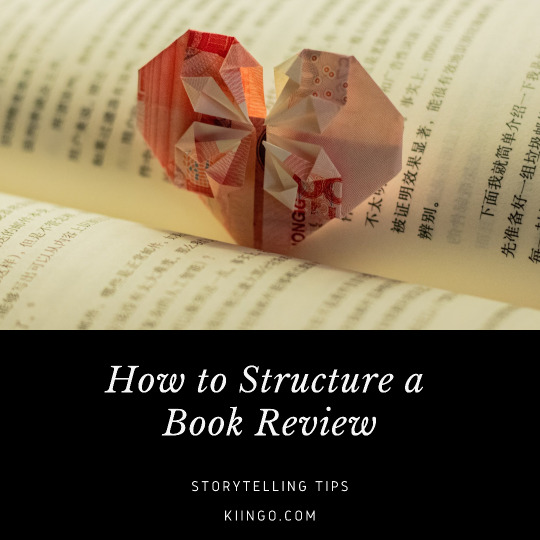
The Structure of Story is now available! Check it out on Amazon, via the link in our bio, or at https://kiingo.co/book
.
.
.
Every author starting out will know how important reviews are. If you’re yet to be convinced, here are some fun facts about reviews*:
1. 88% of consumers trust reviews as much as personal recommendations.
2. 72% of consumers will take action after reading a positive review.
3. Positive reviews tell Amazon and Google you’re worth ranking and can boost search results for your book by feeding into SEO (reviews account for almost 10% of total search ranking factors).
So reviews aren’t just a nice to have — they’re critical to the success of a book.
Now, amongst the writers community, we talk a lot about receiving reviews, but less so about giving reviews. I enjoy writing book reviews immensely, because it makes me think about what I’m reading on a different level, and forces me to learn how to articulate that opinion. This is actually one of the main reasons why I got into professional BETA reading.
I was asked recently how I structure my book reviews (all of which can be found on my blog), so here you have it: all the secrets to how I go about writing book reviews, along with some concrete examples!
Start With Why.
The most important question to ask yourself before you even start writing a review is this:
Why do people read book reviews?
In essence, they want to know whether the book is good, what it’s about, and — more importantly — whether they should read it. They generally like some context and detail to back the review so that they feel it’s genuine and trustworthy.
If you can keep in mind what people generally want to get out of a book review, this will help you keep your review relevant and useful. It’ll help you figure out what’s worth including and what isn’t. If in doubt, ask yourself what you would want to read about in a review when you’re trying to decide whether or not to buy a book.
Some Key Questions.
Before you start writing, you also need to ponder a few things. It may not always feel natural to reflect on a book on this level of detail — it didn’t for me at first. I either liked a book, or I loved it, or I didn’t, but I rarely spent a lot of time critically thinking about why I did or didn’t like a read.
If you’re also finding this uncomfortable at first, I say stick with it. I found it extremely interesting to make myself think these things through. It’s made my writing so much better, because I’ve developed that objective evaluation muscle that activates even when I’m with my own work. It’s also made me much better at forming and formulating an opinion, which is something I didn’t use to be good at!
Here are some questions to start with before you start on your review:
• Did you like the book?
• What did you like about it?
• What didn’t you like about it?
• Are there any themes that were particularly well handled?
• Were there any characters you liked above others, and why?
• Would you recommend the book to a friend?
These few questions will start shaping your view of what you’ve read and provide the main elements of your review.
To take your critical reading to the next level, you may want to ponder the various elements of the story and the writing as a whole. Think about:
• The plot / storyline — is it strong? Consistent? Original? Enticing? Are there gaps?
• The characters and character arcs — are all characters well developed? Multi-layered? Do they make sense? Are they relatable?
• The key themes — what are some recurring topics through the story? Are they well handled?
• The pace and timeline — is the story progressing at a good pace? Where does it lag? Does the timeline make sense?
• The writing style — how was the writing style? Did it flow well? Did it feel unique or original?
• The dialogues — did they feel natural? Were they believable? Were they engaging? Did they add to the overall story?
• The editing — how was the editing? Were there any typos or formatting errors?
Example Review Outline
Once you’ve spent some time with those initial questions, you’ll find it gives you the best part of your review content. At first, you may want to note down your answers to each of these. With time, you may find you can process these in your mind faster than you did before, and you don’t need so many notes. Whichever way is right for you, once you have this, you’re ready to start structuring your review.
I tend to use the following outline (though, of course, this isn’t the one and only way to write a review!):
1. Star Rating:
It’s most common in this day and age to include a rating in your review. There are talks out there about not leaving a rating on a book, because these can be extremely subjective — someone’s three-star rating may mean they loved the book but for others it’s a negative rating, some people don’t leave five-star reviews out of principle etc.
If you’re reviewing the book on Amazon and Goodreads however, you don’t have a choice but to pick a rating out of five stars. Have a think about how that rating system relates to you. For instance: would you leave five star ratings? What rating do you use for a book you liked versus a book you absolutely loved? What kind of book would warrant a low-rating? etc.
2. Opening:
Start with a short overview of what you thought of the book. This should give the reader a concise view of what you thought of the book, in two or three sentences. The idea is that, if they read only this opening part of the review, they should know your view on the matter.
Here’s an example opening paragraph I wrote for Heart of a Runaway Girl by Trevor Wiltzen:
‘Heart of a Runaway Girl is a breath of fresh air. As far as crime and murder investigation novels go, I only ever read Agatha Christie, so my standard is high. But this book did not disappoint.’
3. Synopsis:
The next section of the review is a short summary of the book, which should give the main elements of the plot. I tend to keep that part really short because I find that, if anyone wants to know the specifics, the book blurb the author so diligently wrote for the back cover is a much better place to learn more about that. Yes, you need to give a sense of what the book’s about, but it shouldn’t be the bulk of the review.
I think this is a matter of personal preference, I’ve seen reviews out there with a much longer synopsis section, but I always find myself skipping those bits to get to the nitty gritty of the review, which is what the person thought. There again, go back to the why — people who read reviews do so to find out whether or not they want to buy a book, so the more valuable pieces to help with that (in my view) are your opinions, more than an in-depth summary which they can find elsewhere.
For instance, when I reviewed Counter Ops by Jessica Scurlock, the second opus in the Pretty Lies series, I kept the synopsis paragraph to:
‘In Counter Ops, we meet a familiar duo, Ivy and Nixon, as they face the aftermath of the Elite Auction, and each endure its painful consequences. We follow their journey as they try to escape their fate and attempt to come to each other’s rescue — in more ways than one.’
4. Highlights:
The next part is what I call the ‘highlights’. This is where you talk about what you liked most about the book, or what you thought the strongest parts of the book were. This can focus on one element of the book (a character, a part of the plot, a theme etc.) or cover multiple elements.
See, for example, the highlights I picked for my review of Age of the Almek by Tara Lake:
‘I loved the author's ability to give every character their own voice and a distinct perspective on the world around them. I loved how involved I became with every character's fate and woes. I loved the precision with which the Almek world has been created, with such minuteness you can picture it down to the finest details.
My favourite part is the portrayal of the many facets of human nature, be it through the reactions of the masses to the barbaric ways of their rulers or the individual views of the protagonists. In every Almek citizen is a piece of the great puzzle that is humanity at large, and the author has a gift for writing it as raw and real as it gets.’
5. Mitigate your view:
Right after the highlights is where you’d add anything that mitigates your view. That’s anything that wasn’t quite as strong as you’d want it to be, or anything you weren’t a fan of.
You can skip this part if there’s nothing you didn’t like about the book — you don’t have to go nitpicking if nothing comes to mind. And it doesn’t have to be a bashing of the author and their work either. Keep it constructive and explain why you felt that way. There’s never a need for insults or expletives, and these wouldn’t enhance the quality of your review anyways. Formulating constructive criticism takes practice, and requires tact and subtlety. It’s a valuable skill to have if you’re willing to invest time in honing it.
Here’s how I phrased that part of the review for Crazy Rich Asians by Kevin Kwan:
‘But - and there's a but - my qualm with this book is that, for a story that revolves entirely around Nick and Rachel... There's actually very little Nick and Rachel in it!
Yes it's all 'about' them and it talks 'of' them loads, and we're told theyare happy together and want to be together... But it's all 'tell' and no 'show'. Their intimacy is sorely lacking, so I was left missing that added colour to convince me that they, in fact, do love each other. And I'm not talking saucy passages — I 'm talking about basic things suchas them actually talking to each other and spending time together.’
6. Conclusion:
The final part of the review is a short paragraph with closing remarks, such as a short summary of your view on the book, whether or not you recommend it or some indication of what readers the book may be for (e.g. ‘if you liked… you may like this book’).
When I reviewed Collision by Kristen Granata, I ended the review with:
‘Readers used to intricate, far-fetched romance plots may find this book too straightforward for their liking. In my mind, this is what makes the book's key strength: it's real and honest, it takes the reader through difficult situations and complex emotions beautifully, and that makes it all the more relatable.
A great read overall - and the moment I finished the last page, I was on Amazon ordering the next book in the series!’
How long should a review be?
I don’t think there should be a minimum or maximum word count to a review, though I find that mine end up being around 300 to 500 words. I feel this is a good length because as a reviewer this forces me to be concise and clear in expressing my opinions, and as a reader it’s long enough to give people a sense of the book, but not too long that they’ll drop off before the end.
Final Thoughts: To spoil or not to spoil?
My view on adding spoilers in your review is simple: DON’T.
Try as I might, I can’t fathom what could be gained from adding spoilers to a review. Once again: back to the why. Someone reads a review to find out if they want to read the book themselves. If you ruin the plot for them in that review, what’s the incentive to pick up the book?
It just hurts the author’s chances of making a book sale, and it robs a fellow reader of the joyful rollercoaster of finding out those plot twists at their own pace. Don’t do it, it’s just rude.
*Sources:
www.bookmarketingtools.com
www.searchenginewatch.com
www.dealeron.com
#writingtips#screenwriting#creative writing#writers on tumblr#writers#writing#writerblr#writing advice#writing community#writing resources
11 notes
·
View notes
Note
Hey, d'you have any French book recs? I'm trying to work on my French, and rn I have downloaded one of my favourite book series' French translations, but I figured maybe books already written in French might work better? Also have you read the Ranger's Apprentice series? 1/2
RA's def flawed - the books' narration does like to point bright arrows at the protagonists' intelligence, and the last few books def have the tone of 'old white man trying to write feminism', although at least he's trying? - and it's aimed more to the younger side of YA, but it is still a very fun series, and I can ignore the flaws fairly easily, at least partly due to nostalgia? This rather long lol but I'm wordy.
I'll start with the second question: no, although every time the series is brought up I have to check the French title and go "oh, right, I've seen these books in stores". But I've never purchased or read them. It sounds like something I probably would have enjoyed as a teen but I just missed the mark, and these days I'm trying to drown myself in queer books, so that probably isn't happening.
As for your first question, geez, I haven’t read a French book in years, so this is gonna skew middle grade/YA, though that may not be so bad if the point is to learn the language. I will also say that as a result, these may read a little outdated.
I'll put it under a cut, even if Tumblr has become really bad with correctly displaying read mores. Sorry, mobile crowd.
It's also likely that old readers of the blog will have seen me talk about most of these. I don't feel like going through old posts.
One last thing: while I was curating this list I took the time to make a Goodreads shelf to keep track of those.
The Ewilan books by Pierre Bottero
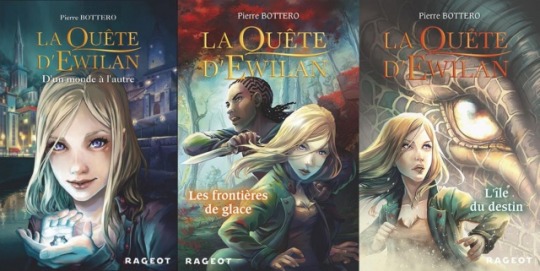
(It's a testament to how long ago I read these books that these are not the covers of the edition I own, and I can't even find those on Google. I'm settling for a more recent cover anyway since it'll make it easier to find them, presumably)
There are at least three trilogies (that I know of) set in the same world.
The first trilogy is essentially an isekai (so, French girl lands in parallel fantasy world by accident) with elements of chosen one trope, though I find the execution makes it worth the while anyway.
The second trilogy is a direct sequel, so same protagonist but new threat, and the world gets expanded.
The third one is centered around a supporting characters from the previous books, and the first couple of books in it are more her backstory than a continuation, though the third one concludes both that trilogy and advances the story of the other books as well.
Notably these books have a really fun magic system where the characters "draw" things into existence. It's just stuck with me for some reason.
A bunch of stuff by Erik L'Homme
I have read a lot of this man's books, starting with Le Livre des Etoiles.
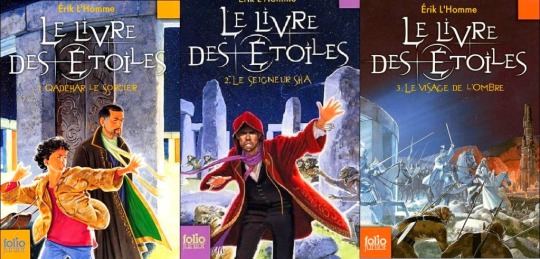
They also skew towards the young end of YA, arguably middle grade, I never bothered to figure out where to draw the line. They're coincidentally also using the premise of a parallel world to our own (and yes, connected to France again, the French are just as susceptible of writing about their homeland), but interestingly are set from the point of view of characters native to the parallel world.
It also has a very unique magic system, this one based on a mix of a runic alphabet and sort-of poetry. I'll also say specifically for these books that the characters stuck with me way more than others on this list, which is worth mentioning.
This trilogy is my favorite by Erik L'Homme, but I'll also mention Les Maîtres des brisants, which is a fantasy space opera with a pirate steampunk(?) vibe. I think it's steampunk. I could be mistaken. But it's in that vein. It's also middle grade, in my opinion not as good, but it could just be that it came out when I was older.
Another one is Phaenomen, which was a deliberate attempt at skewing older (though still YA). This one is set in our (then-)modern world and centers a group of teens who happen to have supernatural powers. I guess the best way to describe it is a superhero thriller? If you take "superhero" in the sense of "people with individualized powers", since they don't really do a lot of heroing.
...I really need to brush up on genre terminology, don't I.
The Ji series by Pierre Grimbert
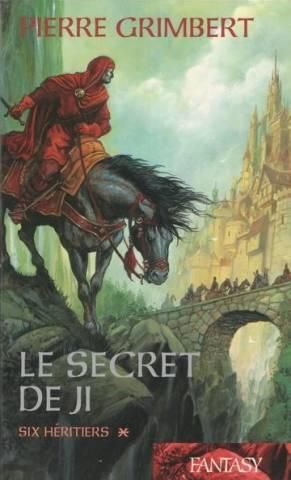
This one is actually adult fantasy, though it definitely falls under "probably outdated". It is very straight, for starters, and I'd have to give it another read to give a more critical reading of how it handles race (it attempts to do it, and is well meaning, but I'm not sure it survives the test of time & scrutiny, basically).
If I haven't lost you already, the premise is this: a few generations ago, a weird man named Nol gathered emissaries from each nation of the world and took them to a trip to the titular Ji island. Nobody knows what went down here, but now in the present day, someone is trying to kill off all descendants from those emissaries, who are as a result forced to team up and figure out what's going on.
I'm not going to spoil past that, though I will say it has (surprise) a really unique magic system! I guess you can start to piece together what my younger self was interested in. Which, admittedly, I still am.
Once again, this one also has a strong cast of characters, helped by rich world building and the premise forcing the characters to come from many different cultures (though, again, I can't vouch for the handling of race because it's been too long).
The first series is complete by itself, though it has two sequel series as well, each focusing on the next generation in these families. Because yes, of course they all pair up and have kids. Like I said: very straight.
A whole lot of books by Jean-Louis Fetjaine
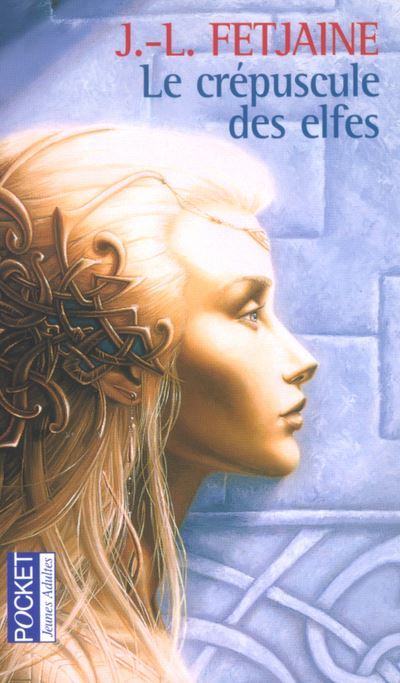
OFetjaine is a historian, and I guess he's really interested in Arthurian mythos especially, because he loves it so much he's written two separate high fantasy retellings of them! I'm not criticizing, mind you, we all need a hobby.
The former, the Elves trilogy (pictures above) is very traditional high fantasy. Elves, dwarves, orcs, a world which is definitely fictionalized with a pan-Celtic vibe to it. The holy grail and excalibur are around, but they're relics possessed by the elves and dwarves with very different powers than usual. Et cetera.
Fetjaine also really loves his elves (as the titles might imply), and while they're not exactly Tolkien elves, there's a similar vibe to them. If you like Tolkien and his elf boner, you'll probably like this too. And conversely, if that turns you off, these books probably also won't work for you.
This series also has a prequel trilogy, centered around the backstory of one of the main characters. I...honestly don't remember too much about it, but I liked it, so, there you go, I guess.
I said Fetjaine did it twice. The other series is the Merlin duology, which, as the title implies, is a retelling of Merlin's story. Note that Merlin is also in the other trilogy, but it's a different Merlin; like I said, completely different continuities and stories.
This one is historical fantasy, so it's set in actual Great Britain, and Fetjaine attempts to connect Arthur to a "real" historical figure...but, you know, Merlin is also half-elf and elves totally exist in Brocéliande, so, you know. History.
Okay, that's probably enough fantasy, let me give some classics too.
L'Arbre des possibles et autres histoires - Bernard Werber
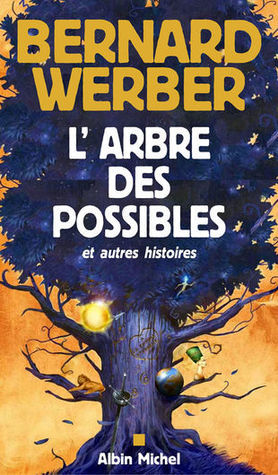
Bernard Werber is a pretty seminal author of French sci-fi and I should probably be embarrassed that the only book of his that I read was for school, but, it is a really good one, so I'll include it anyway.
It's a novella collection, and when I say "sci-fi" I want to make it clear that it's very old school science fiction. It's more Frankenstein or Black Mirror than Star Trek, what we in French call the anticipation genre of science fiction: you take one piece of technology or cultural norm and project it into the future.
It has a pretty wide range of topics and tones, so it's bound to have some better than others. My personal faves were Du pain et des jeux, where football (non-American) has evolved into basically a wargame, and Tel maître, tel lion, where any animal is considered acceptable as a pet, no matter how absurd it is to keep as a pet. They're both on a comedic end, but there's more heartfelt stuff too.
L'Ecume des Jours - Boris Vian
(no cover because I can't find the one I have, and the ones I find are ugly)
This book is surrealist. Like, literally a part of the surrealist movement. It features things such as a lilypad growing inside a woman's lungs (and, as you well know, lilypads double in size every day, wink wink), the protagonist's apartment becoming larger and smaller to go with his mood and current financial situation, and more that I can't even recall at the moment because remembering this book is like trying to remember having an aneurysm.
It is also really, really fun and touching. Oh, and it has a pretty solid movie adaptation, starring Audrey Tautou, who I think an international audience would probably recognize from Amelie or the Da Vinci Code movie.
I don't really know what else to say. It's a really cool read!
Le Roi se meurt - Eugène Ionesco
Ionesco is somewhat famous worldwide so I wasn't even sure to include him here. He's a playwright who wrote in the "Theater of the Absurd" movement, and this play is part of that.
The premise of this play is that the King (of an unnamed land) is dying, and the land is dying with him. I don't really know what else to say. It's theater of the absurd. It kind of has to be experienced (the published version works fine, btw, no need to track down an actual performance, in my humble opinion).
The Plague - Albert Camus
You've probably heard of this one, and if you haven't, let me tell you about a guy called Carlos Maza
youtube
I'm honestly more including this book out of a sense of duty. The other three are books I genuinely liked and happen to be classics. This book was an awful read. But, um. It's kind of relevant now in a way it wasn't (or didn't feel, anyway) back in 2008 or 2009, when I read it. And I don't just mean because of our own plague, since Camus's plague is pretty famously an allegory for fascism, which my teenage self sneered at, and my adult self really regrets every feeling that way.
Okay, finally, some more lighthearted stuff, we gotta talk about the Belgian and French art of bande dessinée. How is it different from comic books or manga? Functionally, it isn't. It really comes down more to what gets published in the Belgian-French industry compared to the American comics industry, which is dominated by superheroes, or the Japanese manga industry, which, while I'm less familiar with it, I know has some big genre trends as well that are completely separate.
The Lanfeust series - Arleston and Tarquin
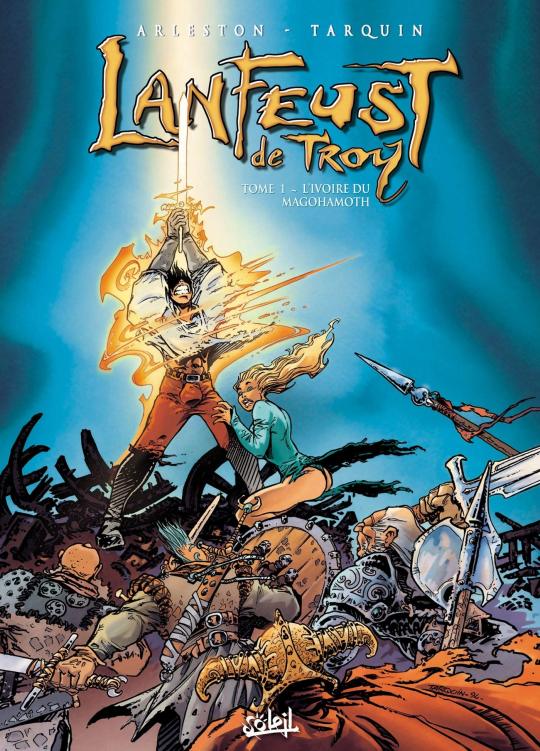
This is a YA mega-series, and I can't recommend all of it because I've lost track of the franchise's growth. Also note that I say "YA", but in this case it means something very different from an American understanding of YA. These books are pretty full of sex.
No, when I say YA I mean it has that level of maturity, for better or worse. The original series (Lanfeust de Troy) is high fantasy in a world where everyone has an individual magical ability but two characters find out they're gifted with an absolute power to make anything happen, and while it gets dark at times, it's still very lighthearted throughout, and the humor is...well, I think it's best described as teen boy humor. And it has a tendency to objectify its female characters, as you'll quickly parse out from the one cover I used here or if you browse more covers.
But still, it holds a special place in my heart, I guess. And on my shelves.
The sequel series, Lanfeust des Etoiles, turns it into a space opera, and goes a little overboard with the pop culture reference at times, though overall still maintains that balance of serious/at times dark story and lighthearted comedy.
After that the franchise is utter chaos to me, and I've lost track. I know there was another sequel series, which I dropped partway through, and a spinoff that retold part of the original series from the PoV of the main love interest (in the period of time she spent away from the main group). There was a comedy spin-off about the troll species unique to this world, a prequel series, probably more I don't even know exist.
Les Démons d'Alexia
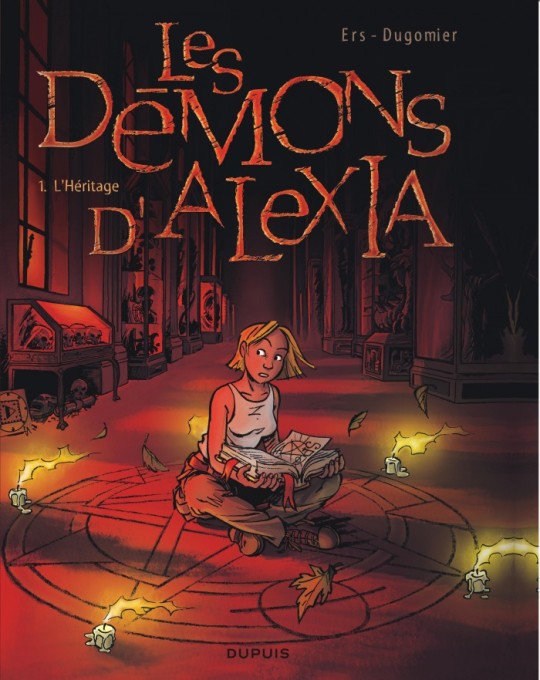
Something I can probably be a little less ashamed of including here.
Some backstory here. The Editions Dupuis are a giant of the Belgian bande dessinée industry, and for many, many years I was subscribed to their weekly magazine. That magazine was (mostly) made up of excerpts from the various books that the éditions were publishing at the time; those that were made of comic strips would usually get a couple pages of individual scripts, while the ongoing narratives got cut into episodes that were a few pages long (out of a typical 48 page count for a single BD album). Among those were this series.
For the first few volumes, I wasn't super into this series, probably because I was a little too young and smack dab in the middle of my "trying to be one of the boys" phase. But around book 3 I got really invested, to the point where I own the second half of the series because I had canceled by subscription by then but still wanted to know more.
Alexia is an exorcist with unusual talents, but little control, who's introduced to a group that specializes in researching paranormal phenomena, solving cases that involve the paranormal, that kinda stuff.
As a result of the premise, the series has a pretty slow start since it has to build up mystery around the source of Alexia's powers, but once it gets going and we get to what is essentially the series' main conflict, it gets really interesting.
Plus, witches. I'm a simple gay who likes strong protagonists and witches.
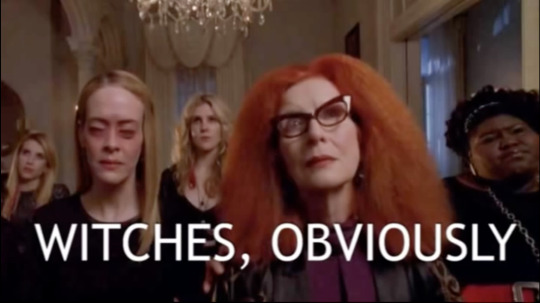
Murena
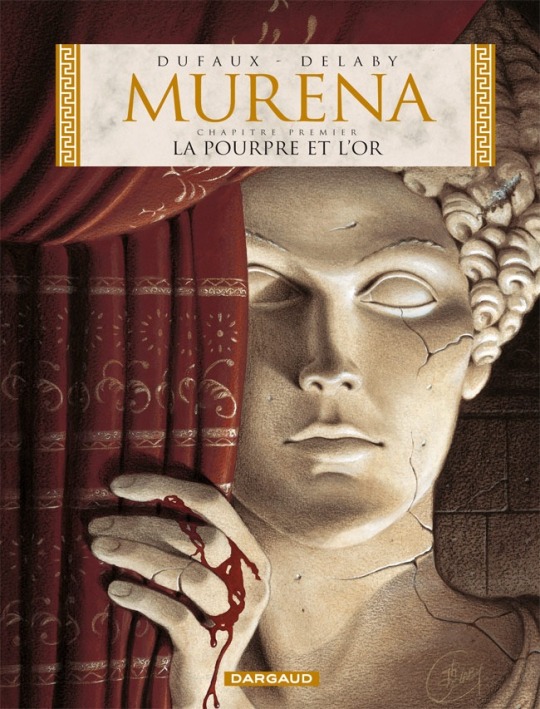
There was a point where my mtyhology nerdery led me to look for more stuff about the historical cultures that created them, and so I'd be super into stuff set in ancient Rome (I'd say "or Greece or Egypt" but let's face it, it was almost always Rome).
Murena is a series set just before the start of Emperor Nero's rule. You know, the one who was emperor when Rome burned, and according to urban legend either caused the fire or played the fiddle while it did (note: "fiddle" is a very English saying, it's usually the lyre in other languages). He probably didn't, it probably was propaganda, but he was a) a Roman Emperor, none of whom were particularly stellar guys and b) mean to Christians, who eventually got to rewrite history. So he's got a bad rep.
The series goes for a very historical take on events, albeit fictionalized (the protagonist and main PoV, the titular Lucius Murena, is himself fictional) and attempts to humanize the people involved in those events. Each book also includes some of the sources used to justify how events and characters are depicted, which is a nice touch.
It's also divided in subseries called "cycles" (books 1-4, 5-8 and the ongoing one starts at 9). I stopped after 9, though I think it's mostly a case of not going to bookstores often anymore. Plus it took four years between 9 and 10, and again between 10 and 11. But the first eight books made for a pretty solid story that honestly felt somewhat concluded as is, so it's a good place to start.
#pierre bottero#la quête d'ewilan#erik l'homme#le livre des étoiles#phaenomen#pierre grimbert#le secret de ji#jean louis fetjaine#la trilogie des elfes#bernard werber#l'arbre des possibles#boris vian#l'écume des jours#le roi se meurt#eugène ionesco#albert camus#la peste#the plague#lanfeust#arleston#tarquin#Les démons d'alexia#ers#dugomier#murena#dufaux#delaby#ask#anonymous#st: other posts
24 notes
·
View notes
Text
Unsolicited Book Reviews (n5): Wife to theKingmaker
Rating:
⭐️⭐️⭐️

Even before I had an account I had a tendency to go to tumblr to see people’s opinions before buying a histfic novel. Certain books are either severely underrepresented where I feel like there needs to be something on them, whereas others that are talked about enough - something more can still be said. So for my quarantine fun, I had decided to start a series where I review every medieval historical fiction novel I read. Hopefully, it will either start interesting discussions or at least be some help for those browsing its tag when considering purchasing it.
TL;DR: Ok swear to god this book was written by two different people. The ending was actually heart-wrenching, but so much had annoyed me throughout that I swore to myself to never again touch this genre for my own health. Twas an odd tale, and tbh the fact that it was odd probably elevated it from the 2 stars (or hell maybe even 1 if it was going to get any more richardian) to 3. Honestly, quite glad I read it in the end. Not the most historically informative, but some of the character arcs were actually quite neat (however extremely farfetched). Spoiler Warning: I’m going to divulge a lot on here because I know no one who follows me is going to read this book.
Plot: Ok, the plot... It was only after I placed my order that I realised this is the Sandra Heath Wilson of ‘Cicely’s King’ fame. I cringed and didn’t know what to do. For all you innocents out there... her Cicely series is a saga wherein Cecily of York pretty much bangs everyone who is male and from the house of york (minus her father and uncle George) and Even Henry VII(!!). She then has this kid by Richard III, calls him Leo and the rest is history(this is what I gleaned from goodreads). Nevertheless it had already shipped and honestly I had it coming; the synopsis does say she has an affair with her brother-in-law John Marquis of Montagu. Whatever, I couldn’t resist buying the only novel about Anne Beauchamp, and since it was published in the 70s/80s I knew it would at least be flamboyant and go all out. It delivered enough for it to have been worth reading.
So the novel follows Anne Beauchamp!(Nan) from when she is a 13 year old girl to 1478 when she finally leaves Beaulieu to go live at Middleham with her (as you guessed it- favourite) daughter Anne and her oh so belovéd son-in-law Richard Duke of Gloucester - You see? Since now finally the Great Other (Mr George) is finally vanquished England has its peace. Of course this is not true, Nan historically left the abbey in 1473 for Middleham and while I wanted a possible explanation from the author (who I would assume is better researched than I) for whether she went to Middleham out of her own volition or simply because the King trusted Gloucester better than Clarence... alas I got none. It was all pinned on the fact that the evil George (who as per usual alternates between omnipotent mastermind to absolute drunken himbo at the turn of a page) would not have her free for as long as she lived (for whatever reason). I really think the real historical explanation was because Edward trusted Gloucester - because after all Warwick Castle was Nan’s patrimony not Middleham. I doubt Nan had a choice in the matter but, the point is, Isabel was alive in 1473 and since there’s zero historical record or suggestion that Nan and Anne had ever seen her again, it would have been nice to have had a depiction of the conflicted feelings or a final meeting written for the three women. I’ll let it slide I guess, after all, one needs to cut some slack when it comes to books written pre-internet age by non-historians. And unlike Sunne in Splendour, this book does not purport to be completely accurate or a representation of the truth.
Christ some sub-plots were truly unexpected. One that made me groan at first was the whole arc between Nan and her niece Eleanor Butler. In this book she’s her ward (not historically true) and little Eleanor is all sweet and innocent and virtuous and, hell, at one point we get more Nan-Eleanor interaction than even between Nan - her own daughters (particularly Isabel who would have been the right age and a better substitute for Eleanor in their dialogue, but alas, who cares about Isabel right?). Eleanor even is the one to accidentally discover that Margaret of Anjou slept with Edmund Beaufort, siring Edward of Lancaster.
Ok. You’re probably thinking, god how trite eugh the Richardians are at it again, right? Yeah ok the Richardians are at it again, but it turns into something really neat at the end. Essentially, as I said, Nan has an affair with John Neville Marquis of Montagu (long story that I will expand on in characterisation) and she and him come upon Edward and Eleanor (overhearing them nothing more). So Edward and Nan then have this mutually assured destruction between them, because Edward divulges that he saw Nan and John years later when Nan confronts him (by this time he is married to Elizabeth Woodville) that she knows about the pre-contract with the intention of telling him off. He tells her that if she dares tell Warwick about the pre-contract he will tell Warwick about John, so she then agrees (also because she promised her niece that she would keep it quiet for the safety of her son by Edward). Years later when they meet again, Edward realised how much is at stake for Nan (especially since it turned out she loved Warwick all along and Edward figured that out), and so, during the period of John’s back-and-forth loyalties (we know he was disgruntled by the loss of the Northumberland Earldom)... Edward returns and tells Nan that if Montagu abandons him he will out her to Richard and cause a massive division between the brothers (militaristically speaking as well) and he knows he can do that because he figures out Nan will not out him because she blubbs about her promise to her niece. This madness then becomes bittersweet when (as history would have it) Montagu does end up fighting for Warwick, nevertheless, Nan is releaved during the whole time because there’s nothing in Warwick’s letters that give any indication that Edward ended up exposing her. Warwick dies in the battlefield, Nan is deeply aggrieved but happy he never found out at least. But then... years later when Edward comes to Beaulieu (1478 as this story would have it) to inform Nan that she may depart for Middleham, he tells her that he in fact did expose her to Warwick... but that Warwick didn’t believe him and laughed in his face because he thought there was no way she could be unfaithful because he knew she loved him. This sounds silly but it got to me a bit when I read it. Of course, we also have Edward saying he regretted his handling of the pre-contract affair because apparently Elizabeth Woodville had since lost interest in him and he’s hurt by how she shows no reaction to him having mistresses and he’s kinda given up, whereas Eleanor would have been more of a lapdog. This was essentially the centrepiece of the plot.
Look, I don’t really read these types of novels as a habit so I don’t know if bizarre plot lines like this are commonplace. Not going to lie though, it threw me and it was pleasantly enjoyable. This is basically what is to be said about the plot... the rest goes into characterisation. Nevertheless, this novel too often fell into the exposition trap (like telling us what is happening politically instead of showing us). While I appreciated the refresher of what happened 1445-1461 and I understand that the target audience of this book aren’t Wars of the Roses experts, I’ve seen it done more smoothly in many other more literary novels (eg Hawley Jarman’s or Lytton-Bulwer’s Last of the Barons). I’ve often said Sunne in Splendour was terribly dry and exposition-heavy, but at least it had historical detail so I could sometimes switch off and treat it as a non-fiction account for battles and character locations. But with this one I a) don’t have faith that the author paid attention to detail; see what I said earlier about the years 1473-1478, so I won’t take this as information and b) know that if she had done this with the years I know more about: 1461-1478, I would have gotten annoyed because of my familiarity with those decades.
Characterisation: Well we have lovelorn saintly Dickon here - always a pet peeve of mine. Look, I don’t have strong opinions about the man but it just innures me how whenever Richardianism rears it’s ugly head the plot suffers massively and it’s always favourite figures of mine that suffer the most. George Duke of Clarence... oh god, what can I say? Wife-beater, alcoholic, is disgusted by his wife when she is ill (you know, unlike the historical Clarence who had resided in the Abbot’s home near the infirmiary for the last months of his wife’s lying-in and after to be close to her and thereafter stuck with her until she passed away and two months after that as well), is stupid yet somehow still devious, is the indirect cause of her death... the list goes on. Welp, at least this Clarence unlike the Sunne in Splendour one has an elegant bearing, sense of fashion and is a great dancer. The Sunne one had NOTHING. It’s also odd that they make his attitude towards Isabel undergo a complete 180 as soon as he realises this marriage will no longer make him king. This makes no sense as the book has them want to marry for love, like YEARS before 1469, so this sudden attitude change makes no sense. Authors really need to be reminded that crown or no crown that marriage would still have made him the greatest magnate in England. There was also a ridiculous handling on the circumstance of his death, and this was the most factually wrong part of the book. Between Ankarette being aged down by 4 decades and the whole shmaz with Stillington, I don’t know where to begin. I bet most of you can guess how it was handled. Isabel is as per usual constantly depressed and without a personality because, well, we can’t have her compared to our shining heroine Anne Neville. 3x more beautiful, 5x more vivacious and 20x more significant than her doormat of a sister who complains all day- that is when she isn’t crying. Gahhh. Of course Anne Neville also cries but it’s for her beloved Dickon who she pines for constantly. Look, I have no qualms with romanticising this pairing, but authors need to keep in mind that Anne was like 13 at most when she became estranged from Gloucester. You. Need. To. Stop. Writing. Her. Like. A. Woman. . I don’t care what anyone says, no matter the time period, you can’t make me visualise a 13 year old that could feel romantic love of that deep a devotion and maturity and not send me laughing across the floor. But want to write a strong childish infatuation coming from a place of deep friendship? Fine by me.
Ok, onto more positive characterisation points: I liked Nan, quite a lot actually (I mean blatant daughter favouritism aside). A lot of authors attempt to write the proud noblewoman and great lady character but few pull it off. This is always how I have seen the real Anne Beauchamp and I’m glad to see it here. For a novel so insensitive towards certain figures, the author wrote Nan with great empathy. She was very intelligent but not in that artificial girlboss way, she loved her daughter(s) but in that medieval mother type of way (so no baby brain here), she may have not gotten along splendidly with all the women around her but there was none of that demeaning cattiness. About that, I want to say I was shocked by what a turn her relationship with Margaret of Anjou took. Since the whole Somerset-bastard child plotline was a thing... Nan was initially revolted and lost all her respect for Lancaster, but when the two women find themselves joined by fate they gain this strange mutual respect for one another. They butt heads a bit initially but Margaret of Anjou rises above it for her son’s sake and eventually strikes up an agreement with Nan on when they are to set sail. Margaret first won’t listen to Nan because she thinks she’s a fool but when she eventually slips by to tell Nan that she had thought about her plan and that maybe she’s right, she doesn’t apologise and Nan doesn’t need her to and it’s this weird telepathic understanding from then on and I certainly did not expect to see something like this in this novel. After the landing in England and news of Warwick’s death reaches the party, Margaret doesn’t gloat but diplomatically relays the news and when Nan says she wants to take sanctuary because she lost all heart and can’t fight on, Edward of Lancaster gently says something like: well if you come with us, you’ll at least get your revenge and that’s at least something (paraphrase). You could just tell this was Edward’s way of offering condolences, the type of way a child like him raised through war and promises of vengeance only could, and it was oddly powerful. Shame it couldn’t have happened as Nan and Margaret and Isabel all travelled at seperate times. The whole theme around Nan was that she wasn’t very partisan but only followed her husband as a magnate and then as a man, which I believe and it was great to see Team Lancaster understood Warwick was a seperate entity from York, and for all intents and purposes they were all in this together. Cool-headedness is much needed in this genre I realise, god how low flies the bar ~
Now onto the characterisation most people are wondering about. What of Warwick? He was the saving grace of the novel. He has the common touch yet he is sophisticated, he is idealistic yet he is shrewd, he is impassioned yet collected, he is dramatic yet subtle, he is ... I can go on and on. What is all the affair plot point about then? It doesn’t diminish the bond between the two main characters; to tell you quite truthfully the relationship the author wrote was bizarre yet still really touching. They used to hate eachother because Nan thought herself above him (after all the Warwick earldom was far more valuable than the Salisbury one- remember it was briefly a dukedom at one point), but then she sees what he made of himself and becomes proud of him and falls in love with him. However, he starts to get carried away with his ambitions, gets all-consumed by the legend of Warwick that he had cultivated and essentially becomes impersonal without wanting to (and realising). Nan feels she has lost him to the people of England (which are apparently all hypnotised by his presence, which ok is a fact grounded in history) and because of her wounded pride she starts seeking comfort in his brother (although, it makes little sense how this would work as I would gather he would also be away, especially at the Scottish boarders). When he refuses to support Warwick over Edward later on, she loses all feelings for Montagu and thinks him a coward, and when Warwick apologises for being amiss she realises that this whole time it was him she loved all along and is racked with guilt. I found this exploration of what it is like being wed to a man of such public standing quite interesting, the idea of losing him not to another woman or such but to his cause (which in this book is a mixture of belief in the french alliance, the common weal and subconsciously his own wounded pride brought on by an extreme adherence to inflexible chivalric values on his part and Edward IV’s actions), I confess, is not something I saw portrayed in this particular manner anywhere else. I mean it’s not like I’ve been searching for this particular motif, but this was a refreshing depiction of a medieval couple and it was a poignantly written relationship which the author had me invested in. The relationship was heartfelt because it was very distinct, Nan and Warwick weren’t just some stand-ins for a cash-grab but some consideration was paid to the real historical figures. The John plotline, sure I would in principle protest against something like this but it seems to have had two plot purposes: To illustrate the strain caused by the aforementioned issue and to kick off the whole Edward-Eleanor Butler-Montagu-Nan arc, which bizarre and unbelievable as it was, kept me on my toes. I’ll let it slide. Also, Edward IV was portrayed as quite a chilling villain in this, beholden of this weird mix of indifference, charm and wickedness.
Prose: This is what made me briefly wonder if this book was written by two different people. It failed to engage me in the first half, the descriptions were trite (except for the natural scenery bits), there was very little variety in sentence structures which gave it the stilted heaviness that thus afflicted The Sunne in Splendour (and most modern literature). There was a lot of redundancies eg the type of stuff like ‘whispered quietly’ or ‘yelled loudly’ and the author’s misunderstanding of certain period fashions drew me out eg references to bodices (not a thing then), calling the henin veil a silk scarf etc. She didn’t pull a Penman: exposit emotions to us, making me feel like I walked into a therapy session, but it was often heavy-handed. It first felt very much like an uninspired debut novel. A bit try-hard and I was wondering if this was the way of the bodice ripper... I wouldn’t know, I never read one before (though I’m unsure if this qualifies as it’s really not graphic and the focus is really not on sex nor is there much of it).
However, out of nowhere, the prose suddenly changed a little before half of the way in; colours, emotions, thoughts and the like started to blend masterfully. The sentence structures started varying to convey the way Nan was feeling. It became very show don’t tell, and it drew me in emotionally a bit (I must confess). Of course, that’s also around the point the plot had sort of started redeeming itself. Nan’s grief at her husband’s passing was particularly well conveyed - how she became a husk of her former self... I could read fifty pages of that. Her realisation that it had been him all along was also well written, and you could feel all the urgency and regret she felt at all the time she had wasted disregarding him as the plot grew nearer to Barnet. The mutual longing was also subtle yet strong, and it really was down to the effective use of sentence structure and waylaying of inspired thematic details. The mingling of past memories with present day in her later years was also very well done and with flow, and the adjectives etc used were no longer becoming distracting as before. My favourite part by far was the very last scene when she rides ahead of her escort to Middleham and she imagines a horse riding beside her caparisoned with the Neville standard; you can really feel how this is the first time that she had felt joy in years and she lets the ghost follow her.
... In Conclusion, this novel gave me very mixed feelings. I don’t know if I would have enjoyed it as much as I did had it not been for the fact that I entered it with a massive pre-formed love for the figures. It’s a bit like my experience with ‘Death Be Pardoner to Me’ (review #2 on this tag), was the book actually good or do I just have an affinity for the protagonist (Clarence in that case)? As such, I don’t think I would reccomend it. Indeed I wrote this spoilerish review because I was sure no one would fly off to Amazon after seeing this post. I can’t say if it’s above commercial historical romance in standard as this is the first time I’ve ever read a book from this genre. I think I’ll take a loongg break from historical fiction (after I finish with Jarman) because the Clarence portrayal was a bit of a nail in the coffin for me and I don’t want to continue upsetting myself for no reason. As I have now truly lost hope in reading a balanced depiction of him and if the literature isn’t absolutely expemplary why bother? Nevertheless, Warwick’s portrayal was a saving grace and made it impossible for me to give it two stars - it wasn’t perfect but still the best I’ve read (minus Last of the Barons Ofc). This is also a bit sad when you think about it, Warwick is also due some fictional justice. Even scholarly if you ask me.
The experience was educational as I learned a valuable lesson in what to avoid and include in my writing, what pitfalls/clichés not to fall into etc. I think I can draw another valuable lesson from this: Dear Histfic authors, if you happen to not be historians, heavily-researched in this time period, objective or literarily talented etc don’t take yourself seriously by publishing some tome of a work but just go nuts like this novel. At least this way you’re not sharing misinformation, inducing people into error and your work still gets to be engaging as opposed to a repetition of the previous amateur historical novelist. Yeah. For all the Sunne in Splendour’s superior quality, I must say I prefer this one better.
Tagging @pythionice who I have recently discovered has also read this book! Welcome fellow fan of Warwick <3
#lady-plantagenet’s book reviews#I’m actually embarasses by how long this is#I got into quite the rambling mood oh gosh#I confuse myself#I hope I have amused some of you with this retelling at least it is outrageous lmao#wife to the kingmaker#sandra wilson#george of clarence#isabel neville#anne beauchamp#richard neville earl of warwick#warwick the kingmaker#richard neville#george plantagenet#anne neville#I’ll add read more function tommorow I’m too tired now#sandra heath wilson
24 notes
·
View notes
Text
why you should read the heartless divine
hello guys! i haven’t used tumblr in a while, so i hope i tag this correctly, but i really needed to write this post to promote a book i think many, many people will enjoy reading for a number of reasons, and i figured i should give it a shot.
the heartless divine is varsha ravi’s debut novel, self-published last november through amazon. it is a ya fantasy romance inspired by mythology and sangam era india, and you can purchase it as an ebook or as a physical copy on amazon.
i 100% recommend it to anyone who enjoys mythology, reincarnation/soulmates, tragic but tender star-crossed romance (and not in a generic ya way either), or just anything with complex plot, character, and relationships—which, i realize, basically means everyone, but in my defence it is really good and worth a read no matter who you are.
what’s it about?
the heartless divine follows two paralleling narratives. the first is set in the distant past, and follows suri, a princess forced into being an assassin by her warlike family, as she is betrothed to the boy king of a neighbouring land after being assigned the task to kill him once the wedding is complete, only to find her plans going off-kilter when she encounters kiran, a strange prophet who predicts his own incoming death and the catastrophe soon to occur. the second is set in modern-day, and follows a reincarnated suri, with no memories of her past life, who finds her life inexplicably tied to a changed kiran, who she does not remember but who remembers her.
the plot is a bit more complex than this, and this is really just a quick summary, but more than that it’s a story about humans and our relationships to each other, to mortality, and to fate.
i highly recommend it - it can be a little slow to start off with, but once the historical plot starts going i found it pretty much impossible to put down. even though it’s been a few months since i read it, i find myself going back to it pretty much constantly. it’s fantastic both as a ya novel to read for fun, and as something far more complex with so many themes, characters, and dynamics to unpack.
but if you need a bit more encouragement:
why should i read it?
as i mentioned, the plot is incredibly engaging. unlike a lot of ya, as well, the heartless divine is super character-based and has incredibly strong characters in its protagonists. the past storyline also has a running mystery - and the reveal at the end as to who is the real villain definitely caught me off-guard on my first read. the past storyline is also deeply tragic in many ways, hitting you emotionally to great effect, and the climax is absolutely one of the most impactful climaxes of any ya book i’ve ever read—i’m making an effort not to spoil anything while writing this, because the pure emotional punch of the climax should be read completely blind.
ravi’s writing is absolutely gorgeous. she has an incredible command over the written word and wrote some incredibly amazing prose in this book. her writing is at once poetic and also incredibly versatile, fitting into beautiful romantic declarations and sharp dialogue and tense scenes of conflict. i won’t include any massive chunks, but here are some of my favourite lines:
Where does the divinity go, then? he had asked her. She had shrugged. To the sky. That is where all divinity goes after it is dead. But the sky was too far away, and there was not enough left of him, divine or not, to guarantee safe passage on a trip so long.
She had always been afraid of hope, in the same way she figured most people were afraid of black holes. Desire was something that consumed, she knew, and to desire impossibility was to let it consume you entirely. hearts splintered with love and splintered with loss, and to fear one was to fear both—it was safer to resist them both, to draw thick, black demarcations in shining permanent marker, explicit, clear lines that gently reminded her of what could and could not be desired.
“You live as though you are already dead,” she whispered. each word sunk into him, cut through his heart with clean, sharp blades. “You live as though your life is nothing but a prerequisite for death, for true purpose. Have you ever fought to stay alive? Have you ever allowed yourself to think of life as something to love?”
They had the same fine boned face, hollow-cheeked and haunted, the same air of a saint that had burnt away to nothing and held the ashes himself. And yet, they were not the same. It was a twisted, imperfect projection—it was him, but not all of him. This was his savage divinity laid bare.
What were love stories but dreams of worlds where the sun and moon could linger beside one another long enough to learn the language of the other’s heart?
ravi also has an incredible grasp on the themes that she’s writing with. above all, the heartless divine is about humanity and what makes people human—our relationships with each other and with our own place in the world. and in my opinion, she expresses these ideas with great maturity and wisdom.
however, for the most part, the heartless divine’s greatest strength is its characters. kiran is a deeply complex character, a prophet caught between his duty to die as a martyr and his desire to make his own choices and follow what he truly loves. he has a complicated relationship to humanity, but no human more than himself, as he struggles to understand the parameters of his own humanity—the place where his mortality ends and his divinity begins. at first, the kiran of the past and the kiran of the present seem deeply separated from each other, but as the story progresses you begin to understand the tragedy of how kiran became who he is in the modern-day.
at first, suri seems like a typical ya female protagonist, but as the story progresses and she begins to let her guard down a bit more, you really start to see how interesting and complicated she is as a character. she doesn’t believe in gods or fate at the beginning of either storyline, but by the end she slowly starts to accept hope into her heart—ending in two very different ways—and advocates for ignoring fate and following the life you want, desperately searching for the happy ending that you deserve. she also has a deeply captivating character voice, and was, certainly at the beginning, my favourite of the three pov characters.
but my personal favourite character is viro, the primary antagonist of the past plotline (though—no major spoilers—he finally makes an appearance in the modern plotline very close to the end). most people i know who have read the heartless divine feel similarly about viro. ravi makes him a deeply compelling character, fleshing out his motivations and reasoning and in turn writing one of my favourite relationships in the book in his complex brotherly relationship with kiran. i don’t want to spoil much about him, but he is a really interesting character and, though technically the antagonist, is just as compelling as the protagonists.
on the same note, before i talk about the romance in the book, i have to mention viro and kiran’s dynamic, as i feel it drives the past plot in many ways and is deeply interesting. the two are adoptive brothers, and find themselves butting heads almost constantly over their different ideological stances; and though it’s clear they love each other, soon enough you start to worry if love is enough.
onto the romance, and of course i have to talk about suri and kiran, because—how could i not. they’re literal soulmates! two souls who find each other in every lifetime! they’re kindred spirits no matter what, in both past and present, two people who understand each other deeply on a metaphysical level, and no matter what their scenes together were a great joy. they’re a romance where both of them help each other grow, even when surrounded by chaos and catastrophe. here’s one of my favourite lines in the book in case you need some more explanation. this is romance.
“‘Love is dangerous, blinding,’” he quoted, voice soft against her cheeks in an empty semblance of amusement. He pulled back slightly, just enough that she could see the gentleness, the raw warmth in his gaze. The clean lack of regret. “And yet, I see you so clearly.”
it’s perhaps less explicit—but bear in mind this is the first book in a series—but ravi also sets up the dynamic between viro and his guard, companion, and best friend tarak in a way that...is practically impossible not to read as romantic. i won’t spoil it because it is something you have to see in person, but some of the most emotionally charged scenes in the novel deal with their dynamic. here’s another line for good measure. they really said we do it for the girls and the tenderyearning gays that’s it.
Tarak let out a ragged sigh, lost and despairing. Viro reached up and put a hand on his, traced the lines of his fingers. he watched him do it, entranced by the movement and saddened by it as well. Finally, he asked, “If I begged, would you stay?” Viro’s fingers stilled in their movement, suddenly hyper-aware of the way Tarak’s hands shook upon the embroidered fabric of his tunic. as if he couldn’t bear to hold him tighter, as if the mere action would wrench him away.
the world building is also incredibly well done, as is the mythology ravi sets up and the folk stories she tells. also, for good measure, ravi is an indian writer and her story is, as aforementioned, deeply inspired by sangam india. i don’t necessarily have the cultural context to interact with the worldbuilding completely, but from where i stand it’s immensely well done.
the second book in the series is currently being written, and i recommend picking up your copy of the heartless divine soon before the series continues. once again, it’s available on amazon, and here is its page on goodreads and thestorygraph in case you want to add it to your tbr!
also, for good measure, shoot me a message here or on twitter (where i normally am) if you do decide to read it and want to discuss it! for good measure, here’s one of my favourite lines from the book—just as a closing statement.
“I want to hear all of your stories,” she said, fierce as fire. “Every single one. I don’t care whether they have happy endings or not.”
#bookblr#book recommendations#book recs#yalit#ya lit#diverse ya#diverse fantasy#ya recs#booklr#ya recommendations#books#the heartless divine
63 notes
·
View notes
Text
“Book People”: a response
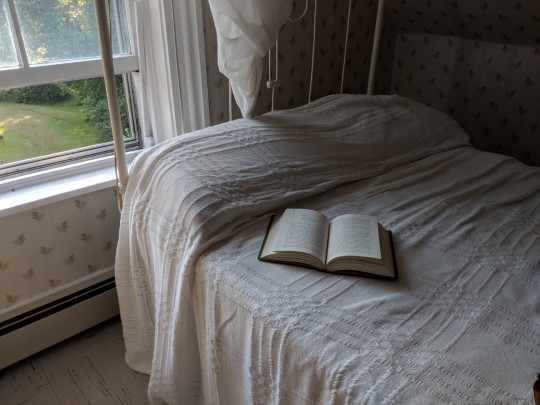
I have been thinking about an essay I read on Jezebel for the last while. It fit in so nicely with something I have been mulling over for months: readers. I mean serious readers. The kind of people that track their reading, that keep up with the publishing industry, that can relate to bookish memes, that overthink how their bookshelf is organized, and that seek out like-minded readers to interact with on social media. This essay, by Joanna Mang, uses a phrase for these kinds of readers: ‘Book People’. Mang uses it in a derogatory manner, and I have heard it used as such before though in those cases I believe the phrase Book Snob would have been more fitting. For Mang, Book People, are not the good sort of reader, but I want to unpack that in a bit.
Mang’s article is titled “We Have to Save Books from the Book People”. I actually only found it through a response written at Book Riot by Tika Viteri (“Back-Talking the Tone Police: Book People are Not Your Enemy”). Essentially, after rereading Mang’s essay a half dozen times (to try and follow the meandering argument and to seek what the point was) I think Mang is arguing a few things: that classics should still be taught in high school and not argued about on twitter, that English teachers bear no responsibility to encourage reading, and that Book People are bad for liking books a whole lot and have a Secret Plot to keep the publishing industry running. What any of this has to do with the title of her article remains unclear.
Mang opens her essay by complaining about people complaining on twitter. Specifically, people that are complaining about the classics they had to read in high school. The Great Gatsby, The Scarlet Letter, and Catcher in the Rye are all mentioned. Even more specifically Mang is upset at the redundancy of these arguments, that they come up again and again. I mean she is definitely correct, because once someone talks about something no one else is allowed to talk about that thing ever again. Ever. Right? I doubt it is the same person rehashing this conversation daily, more likely Mang has stumbled across or perhaps actively searched out these conversations as they are being had by different people. I mean as far as I know there are more than a handful of people using twitter, right? And if it is the same person dredging up this conversation daily, I have a suggestion: unfollow them. Problem solved. But then if that had happened, we would not have this essay to unpack.
Mang seems upset that people on twitter say that they felt forced into reading books that they did not enjoy. According to Mang anyone that disliked these books did so because these books are classics that they just failed to understand. Mang mentions that with a good lesson plan anyone can like classics, but perhaps they did not have a good teacher with a good lesson plan or maybe it is because they just did not connect with the book. Not everyone must like classics simply because they are part of the canon. A book’s inclusion within the canon does not mean that it is necessarily enjoyable to read or study for every single person. It simply means that it was influential in some way. I can recognize and value the significance of a classic novel and still also dislike the reading experience.
I did find it ironic that these conversations on twitter are doing exactly what Mang says she encourages her students to do: “When I teach literature, my goal is to give students the tools and confidence they need to attack and write about texts, to “talk to” the text rather than receive it passively” (Mang 2021). On these twitter threads we have people reflecting back on books that they were required to read in school. But because they are engaging with these texts on twitter it cannot count as the same thing? I have come across some fascinating analysis on classic books on social media that would have made my English professors proud. I fail to see the problem here.
Mang then goes on to speak about the notion of whether certain books should or shouldn’t be taught in school to avoid “turning kids off” reading, since this is often an extension of those twitter conversations. This is something that people in education have been honing for years. A quick google search reveals many theories, pedagogies and lesson plans that can help encourage reading. Teachers and other education experts are out there exploring options to encourage reading in their students. Why though? Why do we want turn children in to readers? Mang suggests that Book People have an odious plot to save the book-as-object which I will unpack in a moment. But maybe it is actually because it increases empathy? Or because it builds vocabulary? Because it prevents cognitive decline as we age? Because it is a stress reducer? Might even make you live longer? Improves general knowledge? Improves writing skills? Aids sleep? Could even help prevent alzheimers? I think it could be at least one of those reasons, especially since most of these studies explain that these benefits do not come from reading those three books back in high school but as a sustained habit over a lifetime. Though Mang, an educator, also states in her article “It’s not an English teacher’s job to make students love reading; an English teacher’s job is to equip students to read and communicate” (Mang 2021). Which I think is certainly true, but (thankfully) many other educators are attempting to go beyond the pressure to yield good test results and are still trying to help their students become readers. Of course, as Mang does mention, the formation of a sustained reading habit is based on more than a single factor (Mang mentions “parental attitudes, family wealth, the student’s disposition and other sources of stimulation”). Why this should excuse English teachers from even trying to encourage reading is lost on me. Further I also wonder what the point there is in teaching students how to actively engage with books if they are not continuing to read outside of school? Why bother with English class at all if this is the case?
I am not here to say that schools should not teach classic literature or should not encourage students to engage with the canon, I am here, however, to say that we can also all go on to complain about it on the internet afterward. If someone does not find value in these conversations, then they are free to tune them out.
After talking about education and American schools’ reading lists, Mang finally gets to the part about Book People. Mang differentiates between readers and Book People stating:
“A reader is someone who is in the habit of reading. A Book Person has turned reading into an identity. A Book Person participates in book culture. Book People refer to themselves as “bookworms” and post Bookstagrams of their “stacks.” They tend towards language like “I love this so hard” or “this gave me all the feels” and enjoy gentle memes about buying more books than they can read and the travesty of dog-eared pages. They build Christmas trees out of books. They write reviews on Goodreads and read book blogs and use the hashtag #amreading when they are reading. They have TBR (to be read) lists and admit to DNFing (did not finish). They watch BookTube and BookTok. They love a stuffed shelf but don’t reject audiobooks and e-readers; to a Book Person, reading is reading is reading” (Mang 2021).
Let’s dig into this before we get to the conspiracy. Just because I am baffled by the snobby tone of this paragraph, and I do not understand what is wrong with any of this.
A Book Person has turned reading into an identity: Just as many people do with any hobby, they tend to entrench themselves within it. People who hike seriously can and have turned that into an identity, they’re hikers. But just about everyone can walk so hikers should then not make their hobby part of their identity? Sometimes people really, really enjoy something and it becomes a big part of their daily life. What is wrong with that?
A Book Person participates in book culture: A culture can form around a social group. So, if we have a hobby group, which is a kind of social group, it is not hard to imagine that eventually a culture would build up around it. So then, yes, people would then also participate in that culture.
Book People refer to themselves as “bookworms”: What I am most puzzled by are the quotation marks, as if this nickname is something strange and new. The first known use of the phrase bookworm dates back to the 1590s and is defined as “a person unusually devoted to reading and study”. Yeah, it is a little dorky, but many hobbyists across various hobbies have silly names for the people of their hobby. Star Trek fans call themselves Trekkies or Trekkers and apparently train enthusiasts call themselves railfans. It’s a hobby thing.
and post Bookstagrams of their “stacks”: As for this, I think this is an example of a fascinating development among readers. Robert A. Stebbins, a scholar of leisure activity and hobbies, has long denied that reading could be considered a ‘serious’ hobby or what he refers to as a Serious Leisure Pursuit (SLP). He has maintained that reading is a prime example of a casual pastime, and even explores his stance in more depth in the book The Committed Reader: Reading for Utility, Pleasure and Fulfillment in the Twenty-First Century. He argues that reading cannot be a SLP due to the solitary nature of reading and the lack of a social world. To Stebbins a social world is a social network group made up of hobbyists and others connected to that hobby. Social media has changed that, however, allowing serious readers to form a social world and also find ways to make the act of reading more social itself. Book clubs have always been an attempt by readers to make reading more social. But social media allows these attempts to get closer to the mark. Readers on twitter host reading sprints to encourage people to read together at the same time. Others host read-a-longs on various platforms such as instagram to encourage a more engaging version of a book club that invites readers to read the same book section by section. And some booktubers (Book People on youtube), host live videos that invite their subscribers to grab a book and read with them. I will digress here for now, but this is something I plan on exploring more on this blog in the future. Put simply, what Mang is disparaging here is actually evidence of reading achieving SLP status under Stebbins’ hobby model. This is simply an active social world of readers.
They tend towards language like “I love this so hard” or “this gave me all the feels”: This is simply how people tend to talk on the internet? Especially amongst fandom communities, of which there is huge overlap in bookish communities. This is hardly exclusive to Book People.
and enjoy gentle memes about buying more books than they can read: memes are things people share on the internet. I am failing to see the issue with this. Again, not something exclusive to book people. What I am starting to see here is that Mang seems to take issue with internet culture in general, more so than with Book People.
and the travesty of dog-eared pages: Only Book Snobs care if other people dog-ear their own books. I am using the phrase Book Snob to distinguish between avid readers and people that find the book-as-object almost sacred. There can be overlap, certainly, but not all Book People see books this way.
They build Christmas trees out of books: No books were harmed in the making of those christmas trees. Oh, is this where the title comes in? Are we saving books from becoming christmas trees? I promise it doesn’t hurt the books.
They write reviews on Goodreads: I am confused by what is wrong with this. Mang stated earlier in her article that and I quote again, “when I teach literature, my goal is to give students the tools and confidence they need to attack and write about texts, to “talk to” the text rather than receive it passively.” How is reviewing a book not doing exactly that? Not all reviews are as aggressive as an essay can be perhaps, but it is still an act of engaging with a text rather than simply consuming it. Further, many Book People likely either have access to or want access to ARCs (advanced reader copies) from publishers and part of that deal is writing an honest review in exchange for the free copy of the book. So that would be them holding up their end of that deal. I am uncertain if Mang takes issue with goodreads in particular or with writing reviews in general.
and read book blogs: People that are active within a hobby often seek out other like-minded individuals. And beyond that most book bloggers are reviewers. Meaning people may be seeking reviews of a book to help them curate their reading selection.
and use the hashtag #amreading when they are reading: another example of Mang’s dislike of internet culture. People use hashtags to help get their media piece to others that may enjoy it or find commonality with it. They are using this form of metadata as it was intended.
They have TBR (to be read) lists: I think non-serious readers have TBR lists as well, but I think they tend to be more unconscious in nature. For example, a non-serious reader may vaguely know that there are some classics that they want to get to, or maybe the latest hyped general fiction novel. Book People are hobbyists, and if we used Stebbins’ model, they are serious hobbyists. They take their chosen leisure pursuit seriously and as such it is on their mind a lot because they intend to spend a significant amount of time pursuing that activity. So, it seems only natural that they may want to organize the content that they want to consume. It appears to me that Mang is more upset that this hobby group has formed in-group vocabularies. This means that only people residing within the group will understand some of the words or phrases used. This is a natural progression of language. You need words to succinctly capture the meaning of something. In this case, many readers have lists of books they want to read, rather than saying all of that it gets shortened down to TBR.
and admit to DNFing (did not finish): Are we saving books from not being fully read? Many of the books that Book People are reading are for enjoyment. If you are not enjoying something, why would you continue it? Do you watch the entirety of a season of a tv show that you are hating? No. Finish a snack that is making you want to vomit it back up? No. Same logic for books. To suggest you must complete a book simply because it is a book is more like Book Snob behaviour. This seems so common sense that I am again inclined to point to this as evidence of Mang’s distaste for in-group vocabularies more than the idea of not reading a book.
They watch BookTube and BookTok: This is further example of the community and social world that readers are setting up on the internet. People typically like making connections and further, making connections over something you share in common is natural. The internet made this easier, and social media has made it easier still. This is just evidence of readers seeking connections with other readers.
They love a stuffed shelf but don’t reject audiobooks and e-readers; to a Book Person, reading is reading is reading: This line is fascinating. Because following this, Mang’s article takes a turn toward a conspiracy about how Book People are trying to save the book-as-object since ereaders have threatened the physical book. And yet here, as part of her definition of Book People, she disparages Book People for finding value in ebooks and audiobooks. Mang herself becomes the Book Snob here, rejecting other book formats. Ebooks are convenient, you can have access to hundreds of books from your chosen device (I like to use my phone personally not an ereader). And audiobooks are great for when you are performing another task such as chores or driving. Both formats also allow people with disabilities better access to books. Audiobooks are perfect for people with visual impairments or who struggle to read. And with ebooks the size of the font can be changed to allow the book to be turned in to a large print book as needed and can even allow the font to be changed into a dyslexic-friendly font. To suggest that ebooks or audiobooks are not real books or don’t count as books is just blatantly ableist.
Let’s get to the conspiracy now. Mang claims that reading became an identity and a culture in response to the decline of interest in reading. She also continues on to say that not only is reading threatened by other media and diversions, but that ebooks and audiobooks distract from physical books. And so with the book-as-object threatened by television and alternate book formats, physical books became more precious. She even goes as far as to say books are fetishized. And then Mang says, “This could be why those arguing that classic books alienate young readers suggest 21st Century titles as substitutions: if we want to keep the book alive, we have to read, and more to the point buy, the books being produced now” (Mang 2021).
So let’s make this clear. According to Mang, Book People are people who have made reading an identity and revel in book culture. And Mang also already said that Book People “love a stuffed shelf but don’t reject audiobooks and e-readers; to a Book Person, reading is reading is reading”. But then Mang changes her argument and says that all of this is about the physical book. So, the people that complain about classics they read in high school on twitter, some of which are Book People, are all actually attacking classic literature because it may turn children off reading which would be bad because that would mean that less people are reading books regularly which is bad because then it means that less people are buying books which is bad because the book-as-object is precious and must be protected and perpetuated.
Riiiiight. I believe Mang conflated Book People with Book Snobs partway through this essay. They are not one in the same and by Mang’s own definition, Book People see any format of book as worthwhile. Meanwhile a Book Snob would uphold the physical book-as-object as the supreme format. So saying that Book People are behind this conspiracy simply does not hold up under scrutiny. Not that this conspiracy should carry much weight at any rate.
But then Mang wipes that argument away, saying that Book People are not that practical. That actually their purpose in complaining about classics books on twitter is solely to revolutionize American schools’ text selection policy. Further Mang seems to think that people ranting about their least favourite classic novel on social media is all about putting pressure on teachers and public education to shape their students into model human beings. When in reality, sometimes one simply needs to whine about a bad book, even if it’s a classic.
At the end of all of this, I am left simply confused about this essay. Firstly the title: “We Have to Save to Save Books from the Book People”. What books are we saving from Book People and how exactly do we go about doing it? Are we saving classics? Or are we saving the current school reading list books? Or physical books? Or ebooks? Perhaps it is that books are somehow being ruined by those that worship that book-as-object? I propose that Mang just thought it sounded good, especially seeing as how it does little to pertain to the wandering argument of this essay.
Secondly, I am also confused about what exactly is the point of this essay. The three main conclusions reached at the end of it seem to be that 1) arguing about classics on twitter does not impact text selection policy in schools, 2) teachers bear no responsibility in encouraging their students to make reading a habit, and 3) that books are not sacred objects. So what?
While I disagree with Mang’s essay, I do still find value in some of the points she brings up, and in her definition of Book People. I have been casually curious about the leisure studies, and where committed readers fit within leisure studies, for the last couple of years. Mang may not understand what she sees before her, but she did see something. It is that insight that has finally spurred me to dig into the social world of committed readers, or as Mang calls them, Book People.
#booklr#book blog#readers#bookworm#bookstagram#booktube#amreading#bookish#book people#paperback revolution
11 notes
·
View notes